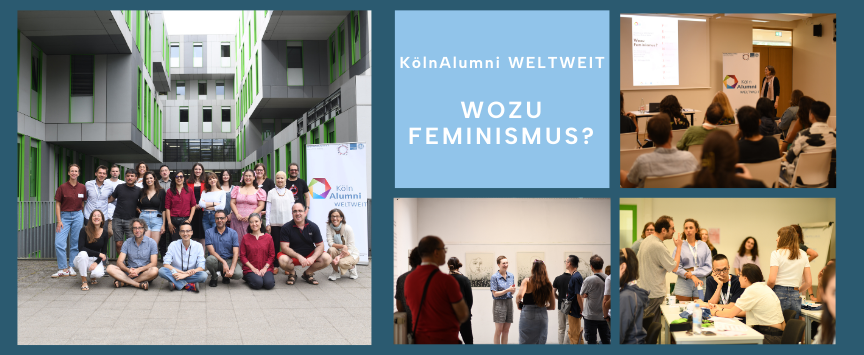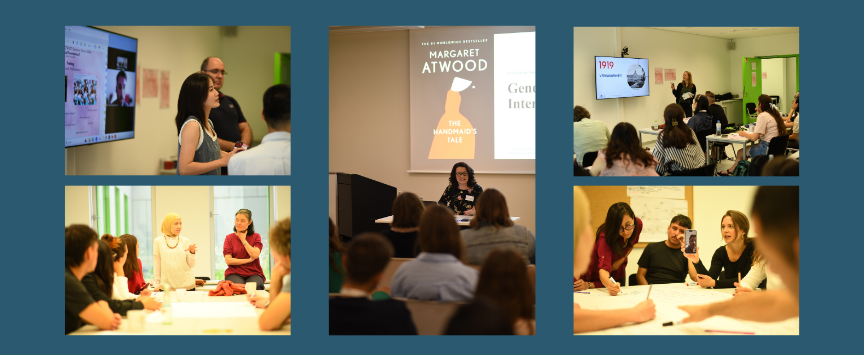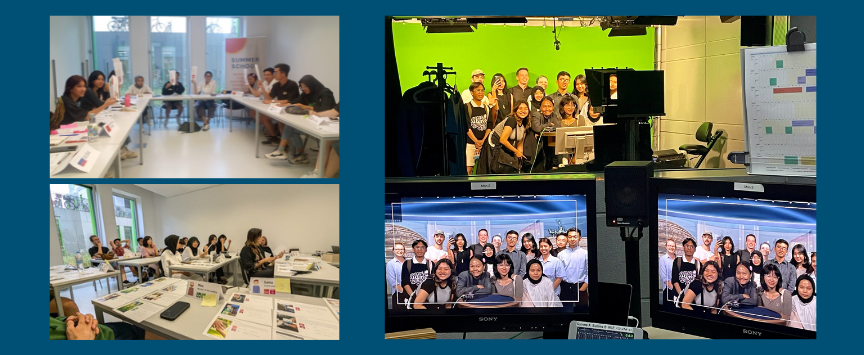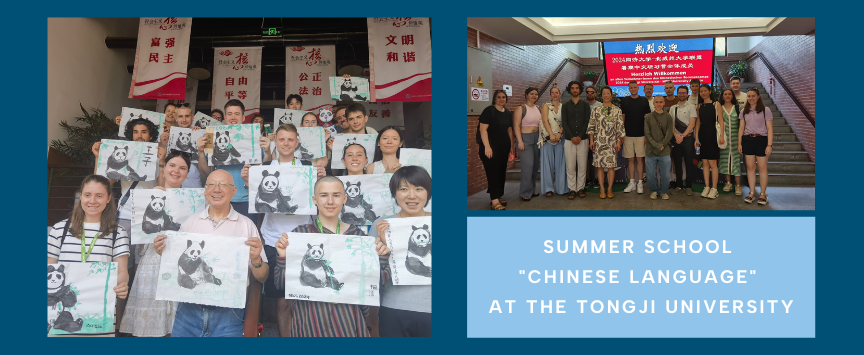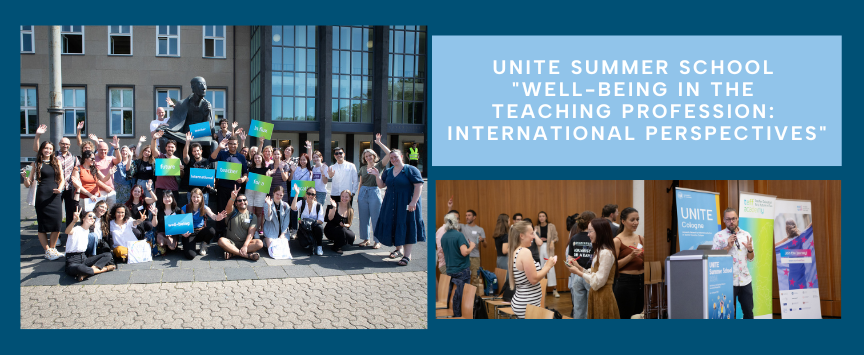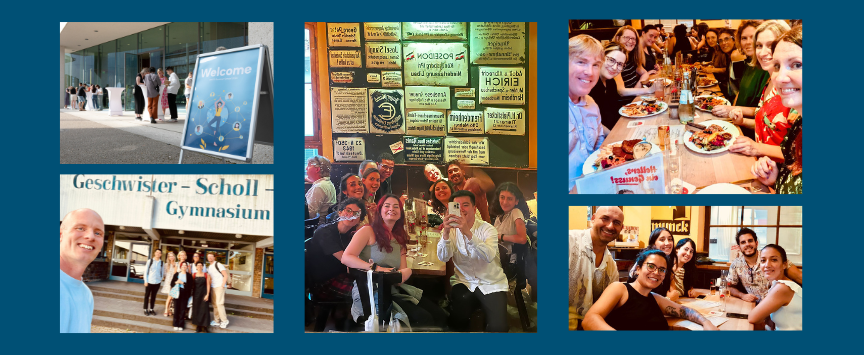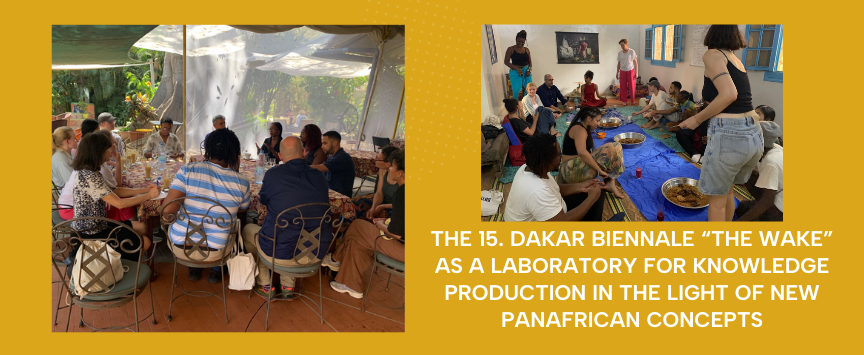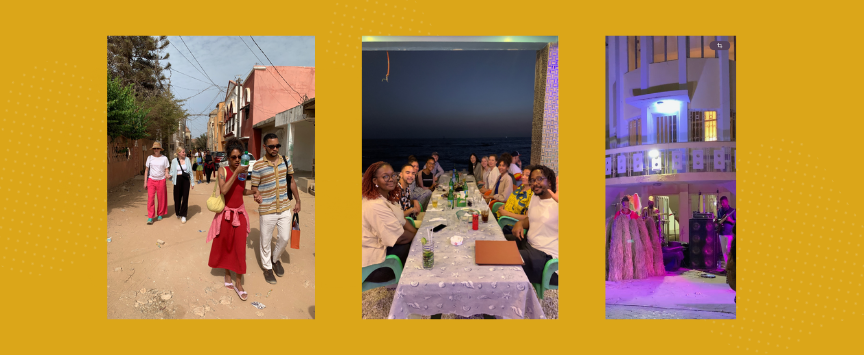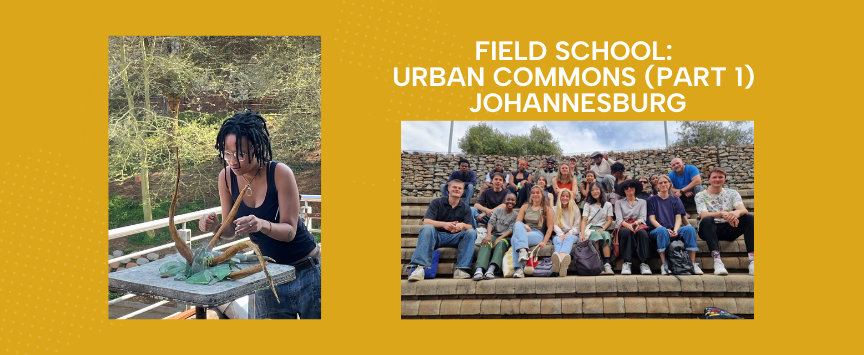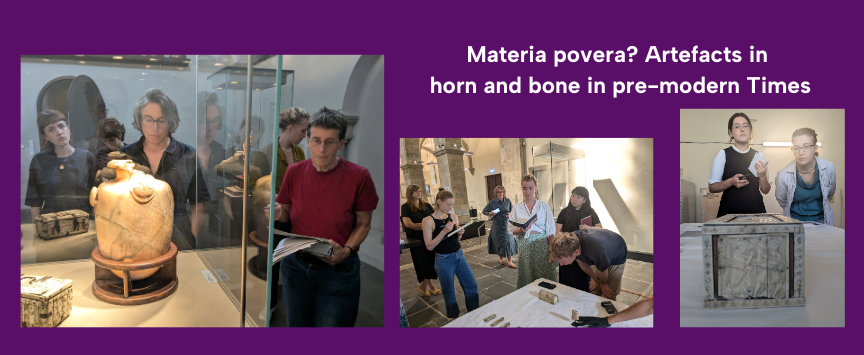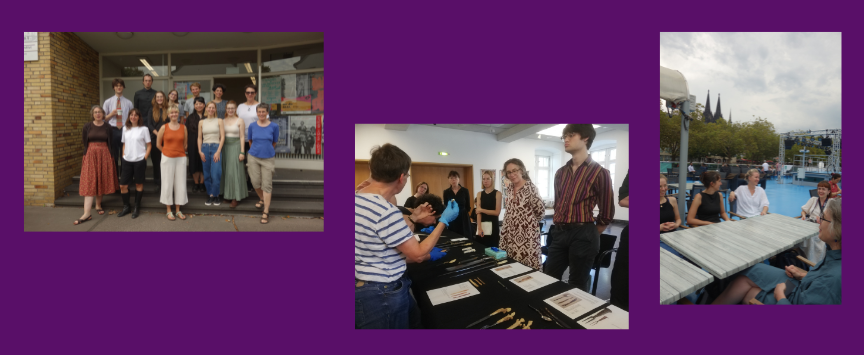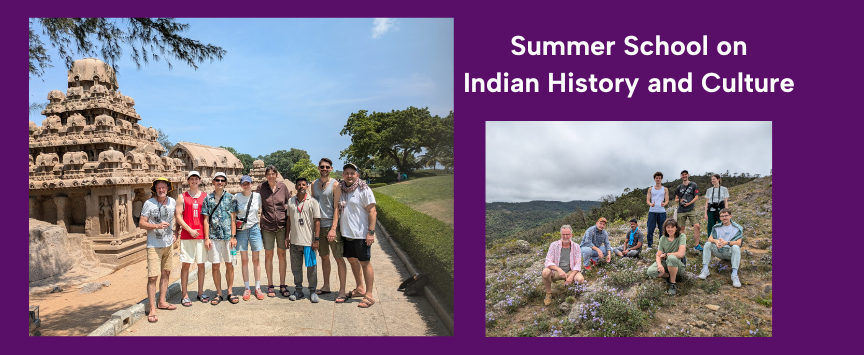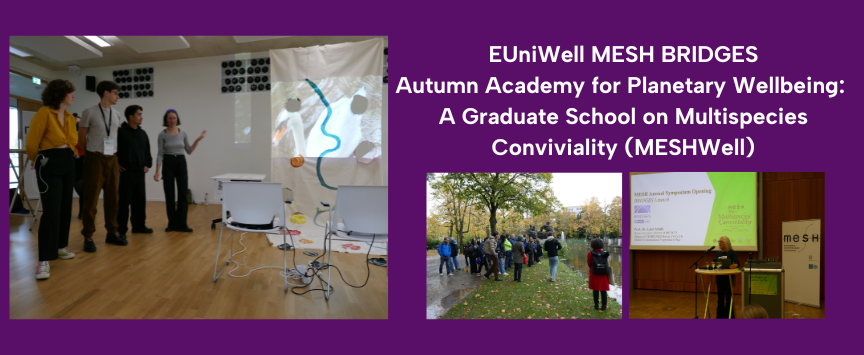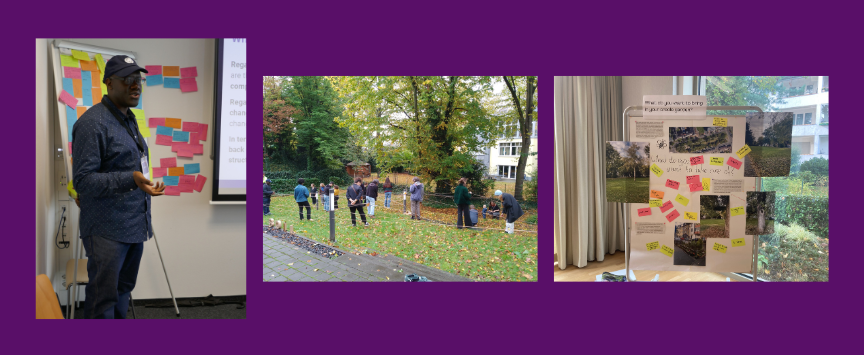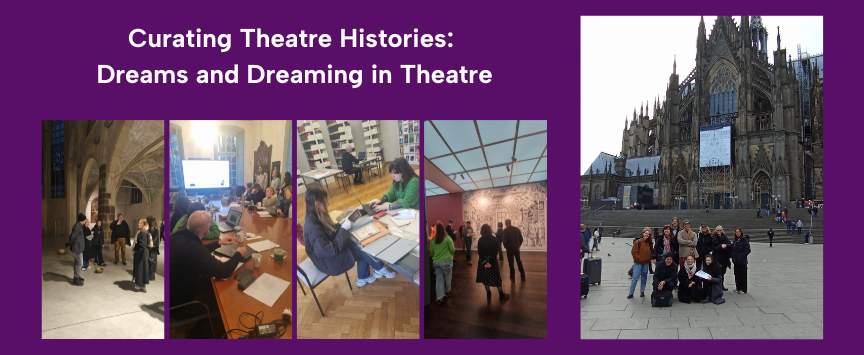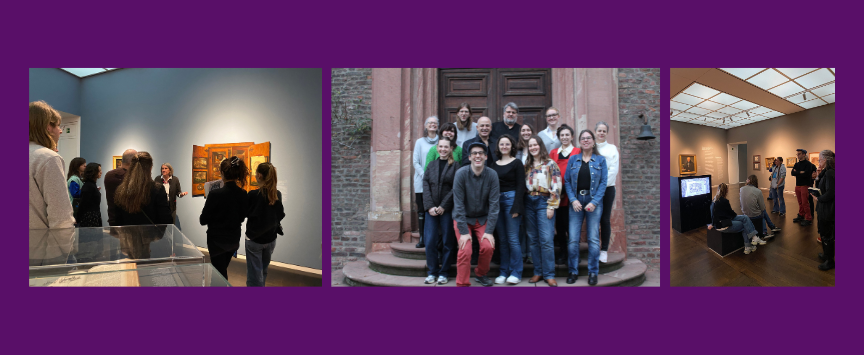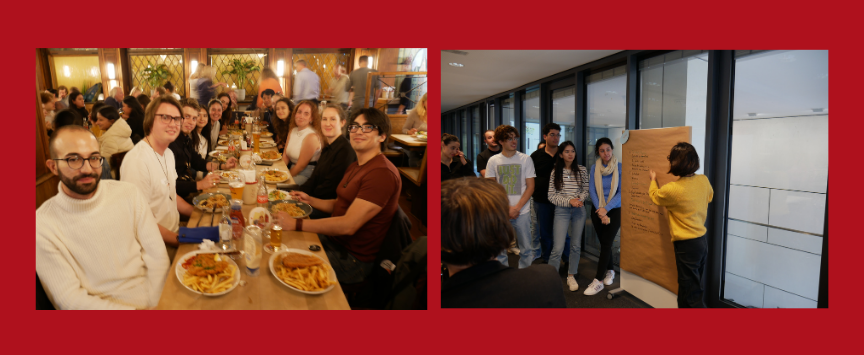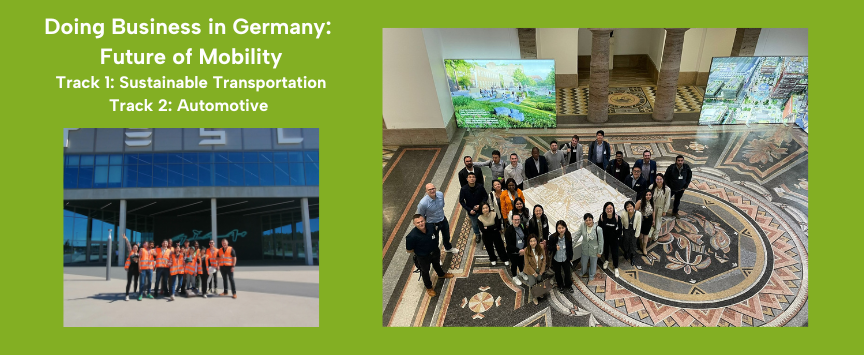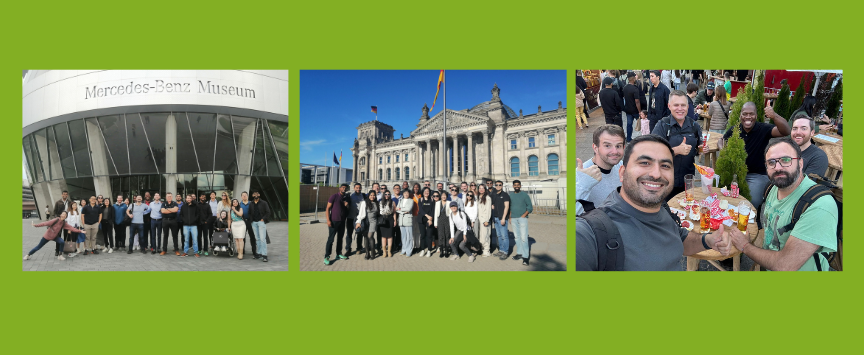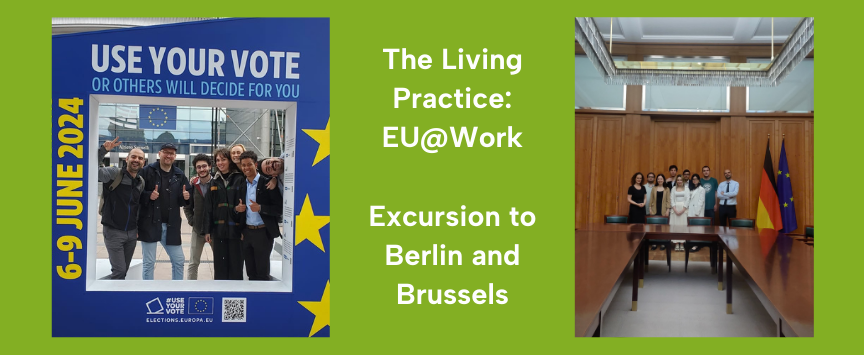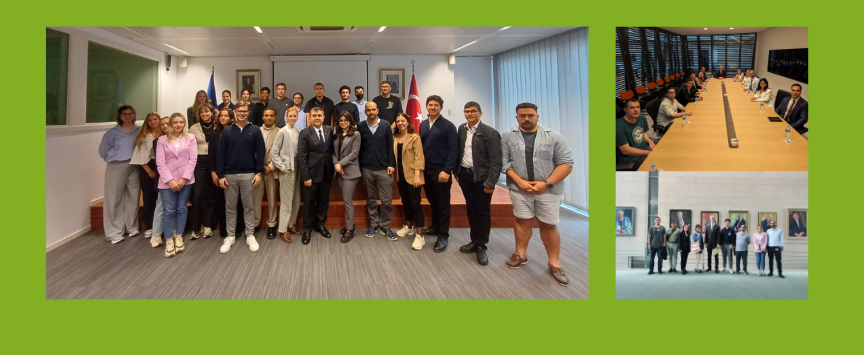Annual Report 2024: Cologne Summer Schools
23 Completed Winter, Spring & Summer School Projects in 2024
We are excited to share the annual report about the CSS-funded Winter, Spring, and Summer Schools in 2024! This year, 23 unique schools brought together 466 participants from around the globe. Supported by mobility scholarships, these programs offered transformative academic experiences, opportunities for cultural exchange, and hands-on learning in a variety of disciplines. In 2024, all six faculties and the Division International Affairs took the lead in organizing these vibrant programs.
The Division International Affairs led four outstanding projects, engaging 91 participants. Highlights included the KölnAlumni WELTWEIT Summer School on Feminism and the UNITE Summer School on Well-Being in the Teaching Profession in cooperation with the Centre for Teacher Education, both held in Cologne. Other notable programs were the student organized summer school “Shaping the Future” and the Summer School “Chinese Language” in Shanghai at the Tongji University.
The Faculty of Human Sciences hosted three innovative projects, including the FIELD SCHOOL: Forget Photography? in Graz, Austria, and the FIELD SCHOOL: Urban Commons in Johannesburg, South Africa. One of the most exciting new collaborations in 2024 was the summer school at the 15th Dakar Biennale in Senegal, creating a platform for new dialogues in Panafrican art and culture. A total of 51 participants took part in these exciting programs.
The Faculty of Mathematics and Natural Sciences organized two schools, including the Trilingual Program Cologne-Tokyo and the International Summer School on Sustainable Cities and Communities, with 52 participants in total.
The Faculty of Arts and Humanities led eight programs with a remarkable number of 146 participants. These programs included a range of interdisciplinary topics and perspectives, such as the LegislEULab 2024 hybrid summer school in European Legal Linguistics that welcomed 10 participants to Cologne. The Materia Povera? Artefacts in Horn and Bone in Pre-modern Times program and the MESH Autumn Research Academy took place on campus in Cologne with international students. The Cold Case CUT project at the Roman site of Xanten engaged 18 participants in onsite archaeological research and excavation, while the Curating Theatre Histories: Dreams and Dreaming in Theatre summer school welcomed 6 participants from Tel Aviv in Cologne. Other key projects included the Cologne Winter School for Medical Humanities at the UoC campus and the Consortium of [six!]: Historical Repertoires Then/Now held in the USA. Additionally, the Indian History and Culture Summer School enabled students to learn and practise the Tamil language in a structured way while at the same time immersing themselves in Tamil society and culture onsite in India.
The Faculty of Medicine hosted impactful programs focused on aging research and biological psychiatry, the first entiteled From Basic Mechanisms to Translational Aging Research program and the second Transitions & Frontiers: The Cologne Summer School in Biological Psychiatry, in total with 45 participants.
The Faculty of Law hosted one specialized program, the Summer School on German, European, and International Criminal Law, which brought 10 participants from Georgia to Cologne to dive into complex legal issues.
The Faculty of Management, Economics, and Social Sciences also played a key role in this year’s events. The faculty organized three programs for 71 participants, including the Living Practice: EU@work, which took participants on an excursion to Berlin and Brussels. Other successful programs included Doing Business in Germany and the CISU MBA.
The total number of granted mobility scholarships is 466. So many participants, students of University of Cologne and its partner universities worldwide, were provided with the opportunity to travel, network and extend their academic and intercultural knowledge. The CSS-Team is more than happy about this achievement and is looking forward to the new summer school season 2025!
The CSS-Team would like to thank all project partners for their engagement in organizing winter, spring and summer schools in 2024. We invite you to read the abstracts, highlights and students' testimonials below to get an idea how inspiring the programs of 2024 were and how these extraordinary opportunities contribute to academic growth and cultural exchange!
As we look ahead, we would like to quote one of our participants, Marianella Bustos from Pontificia Universidad Católica de Chile: “The past two weeks were filled with intense study on diverse teams, inclusion, gender, quotas, leadership competencies, policies, and other crucial topics. A huge thank you to the university representatives who made this experience unforgettable. I’m also deeply grateful to the incredible people I met from different parts of the world for sharing your experiences and perspectives—this wouldn’t have been the same without you! I am convinced that experiences like this make the difference between continuing to do things the way they’ve always been done and doing them differently by integrating lessons learned and evidence to lead change.”
Summer Schools realized by the Division International Affairs
Köln Alumni WELTWEIT Summer School 2024: Wozu Feminismus?
August 4-10, 2024
Abstract
The KölnAlumni WELTWEIT Summer School on the topic “Why Feminism?” took place in Cologne from August 4 to 10, 2024. Twenty international alumnae and alumni took part in the program to explore the many aspects of feminism and to reflect on progress and challenges. In the week-long training session for former international students and researchers at the University of Cologne, funded by the German Academic Exchange Service (DAAD) and COLOGNE SUMMER SCHOOLS, current issues of gender equality and feminist theory were discussed in seminars and during an excursion in an interdisciplinary manner.
Highlights
On Monday Christiane Biehl, Head of Department “International Mobility”, opened the Summer School by giving a warm welcome to the alumnae and alumni representing a plethora of countries: Egypt, Belgium, China, Italy, Japan, Canada, Croatia, Mexico, Taiwan, Hungary and the USA. The opening lecture was held by Judith Arnau, the University of Cologne's central Gender Equality Officer. She highlighted the central role of gender equality officers at universities and their contribution to promoting equal opportunities.
In the evening, the Welcome Ceremony of the KölnAlumni WELTWEIT Summer School took place at the International House of the University of Cologne. Dr. Véronique Sina, a media scientist at the Goethe University Frankfurt, gave a keynote lecture on “Gender, Media and Intersectionality”. With ice-cold drinks and a finger food buffet from Bunte Burger, the guests and participants of the KAW Summer School were able to continue their discussions, celebrate their reunion and network with new alumnae and alumni.
On the third day of the Summer School, the alumnae and alumni moved outside of the seminar rooms in Cologne and journeyed to the Women's Museum in Bonn. The excursion day was opened by an interactive lecture by Maike Sommer and Maria Bobinger from the “Frauenhaus Bonn – Frauen helfen Frauen e.V.” – an initiative that creates and manages anonymous shelters for women in need. Bobinger and Sommer then presented the work of one of the autonomous women's shelters in Bonn in great detail, not only highlighting the immense relevance of their work and the existence of such institutions, but also shedding light on where the biggest (bureaucratic and legal) hurdles to their work lie. The participants were both visibly impressed by the existence and influence of women's shelters on the lives and well-being of women in Germany as well as shocked by the obstacles that the work still entails in 2024. This was particularly evident in the donation that the alumnae and alumni presented to “Frauen helfen Frauen e.V.” at the end of the summer school week on behalf of the KölnAlumni WELTWEIT network.
After a lunch break in downtown Bonn, the group met again at the Women's Museum, where they were greeted by Ellen Junger, curator of the beyond algorithms: digital utopia exhibition. The evening in Bonn ended with a convivial dinner at the Italian restaurant “Nennillo” around the corner, which was even praised by the Italian alumnae and alumni for its Sicilian-style pizza.
On the fifth day, the focus was on feminism and sports. Recent documentaries on the topics of cheerleading and images of women, as well as homosexuality in professional soccer, were viewed together and then discussed on the basis of a list of questions. The participants contributed experiences and knowledge from their countries, thus enriching the discussion of the films with international perspectives.
In addition to the seminars, alumni and alumnae gave lectures on topics of their choice in feminism on Tuesday, Thursday and Friday, which included the role of women in contemporary Taiwan, gender stereotypes among referees in Italy, and empowerment and diving training for girls and women in Indonesia.
The farewell dinner with German ninepin bowling at “Haus Unkelbach”, which has developed into a Summer School closing tradition, marked the end of an inspiring and successful Summer School. Here, the international participants spent a last evening together, deepening discussions on seminar topics, exchanging contacts, and enjoying a cheerful Cologne evening – in keeping with the motto: KölnAlumni WELTWEIT – Always a good time!
Testimonials
“The event was very well organized. It was also the best in its sort from the many in which I participated, in terms of speakers and discussions” (Anonymous testimonial)
“I think this Summer School was very nice and I need sometime to write a journey note for this special trip!" (Anonymous testimonial)
“The Summer School this year was very dynamic and divers. I would suggest to continue implementing new dynamics like games, world café and round tables” (Anonymous testimonial)
“The organisation is getting better every year… I honestly find the Summer School perfect the way it is!” (Anonymous testimonial)
Shaping the Future - Sustainability, Cooperation and Culture
August 5-22, 2024
Abstract
Inspired by a 2023 Summer School in Jakarta, ten Indonesian students were invited to Cologne for the first-ever student-organised Cologne Summer School. The programme took place from 5th until 22nd of August 2024 and included a dynamic agenda of workshops, lectures and site visits. Together, the participants from Universitas Pembangunan Jaya and the University of Cologne explored the key topics of sustainability, cooperation and culture. Throughout, they looked for ways to learn from each other in order to bring their countries together and forward – to shape the future.
Highlights
As the programme was also sponsored by the City of Cologne and supported by the Deutsch-Indonesische Gesellschaft e.V. (DIG), it included a reception at Cologne City Hall and a day organised by the DIG. The two-day trip to Bonn included visits to the House of History, the European Commission, the Federal Ministry for Economic Cooperation and Development (BMZ) and Deutsche Welle. The long road to democracy and freedom in Germany, illustrated in the House of History in Bonn, demonstrated the value of democracy and the constant struggle for its ideals. In addition to visits to political and civic institutions, initiatives such as the car-free zone in Nippes, community gardens and recycling attracted much attention. Such experiences inspired the students to develop their own ideas in Indonesia and in Germany and to explore ways of working together across national boundaries. Other parts of the programme, such as a workshop on transcultural competence or a Model UN simulation discussing a bill on climate change, allowed the students to actively participate and discuss the topics of our Summer School while broadening their perspectives. Another highlight was the opportunity to meet several impact startups such as Plastic Fischer, based in Bandung, Indonesia. Last but not least, the students received several engaging lectures from professors and lecturers from the University of Cologne, all of whom shared their perspectives and approaches to urban sustainability.
Testimonials
“Participating in the Cologne Summer School 2024 provided me with a much deeper understanding of sustainability. I quickly realized that Germany's approach to sustainability is far more advanced than what we have in my home country. One of the most impactful experiences was visiting Plastic Fischer, a company dedicated to managing river waste in Bojongsoang, Bandung. Seeing how much of a difference they’re making was really eye-opening, especially because it highlighted how external efforts can sometimes surpass those of the local community. This experience made me realize that what we’re doing right now isn’t nearly enough to tackle climate change effectively. I believe that approaching sustainability from an academic perspective is crucial. By doing so, I can bring back valuable insights and ideas to implement at home. I’m determined to take what I’ve learned and contribute to more positive sustainability initiatives in my own country. The lessons I’ve gained have given me a stronger sense of responsibility. I’m eager to apply them and help drive the change we so urgently need.” (Rakai Michelia)
“My dream had always been to study abroad, experience a new environment, and meet new people. That dream finally came true when I joined the Summer School “Shaping the Future – Sustainability, Cooperation & Culture.” I had 3 of the best weeks of my life, fully immersing myself in Germany's rich history, unique culture, and inspiring innovations. Visiting the House of History in Bonn to explore World War II, the Berlin Wall, and the development of modern democracy, as well as seeing the Cologne Cathedral—a world heritage site—opened my eyes to so much more.
Each lecture and workshop session was incredibly valuable, from learning about microplastics, creating green cities, impact and sustainability management by "evolutiq Impact Advisory," to sustainability in supply chains by "FOND OF," and more. I was truly impressed by Germany's dedication to innovation and sustainability. The presentations from impactful startups like "Plastic Fischer" and the visit to "The Ship" office, where I heard from various startups, highlighted how Germany integrates sustainability and innovation into everyday business practices. These experiences deepened my understanding of how crucial these elements are in shaping a better future. This summer school program really brought me closer to daily life in Germany. It wasn’t just about learning—it was about truly experiencing their culture.” (Vicka Ellianna Ristanti)
Chinese Language at the Tongji University
August 5-23, 2024
Abstract
The Summer School in Shanghai at Tongji University enables students to gain insights into Chinese culture and society and at the same time allows them to acquire basic Chinese language skills. This year we were able to offer 2 courses with differentiated language levels. An advanced course with 7 participants and a beginner/intermediate course with 8 participants. The students could therefore improve their language skills in an even more targeted way.
Highlights
In addition to lectures, the program also included regional cultural events such as shadow boxing and Chinese painting. A two-day excursion to the picturesque cities of Hangzhou and Wuzhen, as well as to the economically up-and-coming city of Yancheng, was very well received by the participants. The company visit to the German Centre Shanghai was certainly also an important experience. The participants were given a first-hand insight into working and social life in Shanghai through a personal presentation by the CEO, Christian Sommer.
The organizers of Tongji University also provided the participants with excursions, including to the “Oriental Pearl Tower” in Shanghai and a sightseeing boat trip in the evening on the Yangpu River, with a wonderful view of the illuminated facades and skyline along the river.
The Summer School had many impressive highlights. The stay and the experiences will remain vivid memories for all participants.
Testimonials
“The language course was the central component of our trip. The practical approach and motivated teaching staff enabled us to make rapid progress. It was fascinating to overcome the language barriers and at the same time gain deep insights into the local culture. Another plus point was the organization by the university. Everything ran smoothly, from the excursions to our accommodation and lessons. This allowed us to fully concentrate on learning and experiencing. It was great to meet so many new people from different countries and make friendships that will certainly last beyond the summer school. In conclusion, I can only recommend anyone thinking about a summer school to take this opportunity. It was an instructive, exciting and unforgettable time, which not only enriched my studies, but also brought personal experiences and adventures that I will never forget.” (Johannes Berger)
“My participation in the three-week summer school at Tongji University in Shanghai was an unforgettable experience. From the very beginning, we were warmly welcomed by the University and immediately felt at home. The entire organisation was excellent, which made getting started into the program and everyday life in a new culture much easier. The language course in particular was well structured and taught us a lot during these three weeks. I was able to learn a little everyday Chinese, which was not only practical but also very exciting. In addition to the lessons, we had many opportunities to experience the country and its culture up close and personal. The weekend excursions to Hangzhou and Yancheng were definitely highlights. It was impressive to explore these cities and learn about the history of China. What was particularly nice was that I made friends during my stay that still exist today. Some of the friends I made in Shanghai, I also meet regularly here in Cologne. The memories of these three weeks are incredibly valuable and I look back on this time with fondness. It was an all-round successful, enriching and unforgettable experience that I can only recommend to everyone.” (Anton Schulze Wehninck)
UNITE Summer School "Well-Being in the Teaching Profession: International Perspectives"
August 26-30, 2024
Abstract
Can schools be places of happiness and well-being? What if students and teachers focused on their health as much as they did on test scores? Does teaching have an actual impact on societal well-being? These are some of the questions the participants of the UNITE Summer School “Well-Being in the Teaching Profession: International Perspectives” discussed between 26 and 30 August 2024.
In total, 83 students and teacher educators from 21 universities in 17 countries as far away as Argentina and Vietnam as well as school teachers attended the event to learn more about the place of well-being in schools around the world.
The summer school was organised by the Centre for Teacher Education and the Department “International Mobility” in the frame of the UNITE Cologne project (University Network for Internationalization in Teacher Education) in collaboration with EUniWell and teff academy.
Highlights
The opening speech by Prof. Dr. Beatrix Busse, Vice-Rector for Teaching and Studies at the University of Cologne, set the tone for a week of inspiring exchange across languages and school systems, highlighting the importance of teachers as agents of change.
Two keynotes on the first and second day of the summer school served as an introduction to the topic of teacher well-being. PD Dr. Benjamin Dreer-Göthe from the University of Erfurt summarized the current state of research especially in European and Western countries and pointed out aspects which require more investigation. Marcina Singh, PhD, a post-doctoral researcher at the University of Johannesburg, presented her findings about teacher well-being in South Africa and other African states, looking at the complexity, the societal and political dimensions of the topic.
On the first and second day of the event, the participants could choose from 15 workshops on topics as diverse as well-being skills for student teachers, outdoor education, inspiring learning environments, and well-being in the foreign language classroom. The workshops conducted by lecturers from the University of Cologne and its partner institutions were also a great way to learn more about teacher and student well-being in a variety of countries.
Day 3 started with visits to primary and secondary schools. Our guests, led by staff and students from the University of Cologne, got an insight into the German education system and everyday school life by attending lessons (e.g. in English, Spanish, geography, arts or physical education) and speaking to teachers and pupils. Both the schools and the visitors enjoyed the exchange enormously, the latter citing the school visits as one of their highlights of the week.
Using what they had heard, learned, and experienced during the summer school, the participants were then asked to work in small groups and come up with creative ideas on how to tackle some of the challenges (student) teachers are facing worldwide, during an Educathon. An Educathon, short for Ideathon on education, is an innovative learning opportunity based on a collaborative Design Thinking process. All six teams had one day to work on their ideas before pitching their projects on Friday in front of a jury within no more than 90 seconds.
During a welcome barbecue at the Centre for Teacher Education, an outdoor get-together with local students and a dinner at a brewery, the participants had time for informal exchange, making new friends and delving into the cultural richness of Cologne. As one student put it: “I was able to create friendships all around the world, and I now have people to go see again in Europe. (…) This conference is a golden opportunity for any education student”.
Testimonials
“I was able to gain insight into alternative approaches to not only teacher wellbeing but also to pedagogical practice from several other countries. The culmination of this insight was during our trips to schools in Cologne. I had the opportunity to tour a German-English bilingual school and talk to several teachers about their experiences teaching as native English speakers in Germany. It was professionally impactful to see how the German school system is structured and what education looks like halfway around the world.” (Kyle Joseph, student teacher at Mount Royal University, Canada)
“As a lecturer and researcher in pedagogy, I particularly enjoyed the Summer School. It made it possible to bring together experts, teachers, administrative staff and students around an increasingly focused topic by offering a valuable opportunity for networking, research, and informal exchange of experiences. Well-being was put at the centre not only of the lectures and workshops, as a topic, but of the entire organization: informal moments of relationships, physical activities, and lunches together, to appreciate the many dimensions that bring wellbeing into a learning context.” (Assoc. Prof. Dr. Daniela Frison, University of Florence, Italy)
“I really love the educathon session, since I got a lot of insights from all the presentations.” (anonymous online feedback)
“I think we need more experiences of this kind :)” (anonymous online feedback)
Winter and Summer Schools realized by the Faculty of Human Sciences
FIELD SCHOOL: GRAZ - Forget Photography?
November 13-17, 2023
Abstract
Libraries are not passive, value-neutral places where knowledge is collected and made accessible, but active places where discourses are negotiated, contested, and confirmed. Starting from questions about the current role of photography in art and society, FIELD SCHOOL: GRAZ engages with the library’sepistemological processes and knowledge, together with invited artists, curators, and experts. Taken up here, through workshops, lectures, and one’s ownresearch - based artistic experiments, is Andrew Dewdney’s demand to forget photography as a strategy for reflecting on new approaches to organizing knowledge about the visual in the context of culture: How do processes of selection, evaluation, and ordering, as well as search and research, take shape? What (and whose) history of photography is being told? How can gaps be made visible? How does the library become a place of intervention and radical storytelling? With contributions by Reinhard Braun, Christine Frisinghelli, Dejan Markovic, Margit Neuhold, Barbara Petritsch, Nicole Six/Paul Petritsch, Anna Voswinckel, and WERKER Collective.
Faculty: Prof. Karina Nimmerfall, University of Cologne, Faculty of Human Sciences, Department Art andMusic; Leon Filter, University of Cologne; Faculty of Human Sciences, Department Art and Music; Ass. Prof. Rose - Anne Gush, IZK - Institute for Contemporary Art, TU Graz
Local Partner: Camera Austria, Laboratory for Photography and Theory
Highlights
The Field School, hosted by Camera Austria in its library space, started its intensive program on Monday morning with a Welcome for all participating students and a guided tour through the exhibition Exposure by curator Anna Voswinkel. This was followed by a lecture by Christine Frisinghelli, co-founder of Camera Austria, on the history as well as the theoretical and practical groundworks of the institution. In the afternoon Margit Neuhold, editor at Camera Austria and Barbara Petritsch, librarian at the Wien Museum, conducted an introductory workshop on the structure of the library as well as the potentials and politics of its maintenance. Tuesday started with an outing at the IZK’s library space for a close reading of excerpts of Andrew Dewdney’s text Forget Photography. The afternoon continued withan interactive workshop by artist Nicole Six and curator Reinhard Braun on the politics, history of and artistic perspectives on Camera Austria’s archive, an artistic intervention placed in its library. On Wednesday a visit of several exhibitions at the Grazer Kunstverein and the Halle für Kunst, which each were guided by the curators, was followed by a workshop by the Amsterdam based WERKER Collective dealing with artistic methodologies of queering the library and archive. The full day concluded with a public lecture by WERKER’s on their most recent archival work. Thursday continued with a workshop by artist Dejan Markovic, based on his work Rebellious Books, that engaged with professionals from the art field in the form of interviews conducted by the students as well as interventions into the library. The workshop was followed by individual project work of the students, as well as a group discussion. The last day was used to continue the individual project work as well as brief presentations of first drafts for works developed by the students.
Testimonials
"I took part in this year's Field School, which took place in Graz in cooperation with Camera Austria. I really enjoyed the associated workshops, such as the workshop by and with the Werker Kollektiv, Dejan Markovic or Reinhard Braun and Nicole Six/Paul Petritsch, as well as the visits to the Museum für Gegenwartskunst and the Grazer Kunstverein, and I was able to combine them very well with the content of my previous studies. The collaboration with the students at the Institute of Contemporary Art Graz was extremely interesting and relevant for further research on my areas of specialization/interest. The content of the Field School and the knowledge I gained continue to inspire me - also thanks to the format of the one - week intensive collaboration - even beyond the week spent together. I will now incorporate elements of the work shop into an artistic project, which I will present in an exam." (Mareen N. Mueller, University of Cologne)
"The Field School "Forget Photography" offered us students the opportunity of intensively working on the idea of the library and to try them out in practice. The format was characterized by the fact that we exchanged the university space for the exhibition space of Camera Austria in Graz and were thus challenged to engage with the aforementioned contexts. We made small practical interventions in the instituti on's own library and by sketching and developing further projects of our own, the Field School continues to have an impact beyond the week. The Field School offered the opportunity to negotiate a productive working mode together and to actively contribute to tackling the challenges that arose over the course of the week. In various discussion rounds and experimental methods, we were able to work together with the lecturers and artists at eye level and critically address the topics of the week. The program was enriched by visits and discussions at relevant art institutions in Graz, so that we also had the opportunity to get to know the city and the local art scene." (Elias Müller, University of Cologne)
The 15. Dakar Biennale "The Wake" as a Laboratory for Knowledge Production in the Light of New Panafrican Concepts
May 15-23, 2024
Abstract
The Summer School in Dakar, organised in cooperation with the University of the Western Cape, Department of Historical Studies and with the participation of the Cheikh Anta Diop Université, Dakar, Institute of African Literature and Civilisations, was originally planned to take place at the opening of the 15th Dakar Biennale ‘The Wake as a Laboratory for Knowledge Production in the Light of New Panafrican Concepts’. After the main exhibition of the biennial was postponed at short notice, we focussed our planning on the ‘OFF’ part of the biennial with numerous exhibitions, performances, lectures and other events in Dakar as well as the African Art Book Fair with its discussion panels. This gave us a broad insight into Dakar's diverse art scene and enabled us to focus our academic gaze on new pan-African concepts in dialogue with a wide range of actors.
Highlights
Three selected highlights of the academic programme:
1. guided tour and workshop in the exhibition ‘Branching Streams. Sketches of Kinship’ at the Musée Theodore Monod with the researchers and curators Lotte Arndt, Sophie Schasiepen and Ciraj Rassool. The exhibition was organised as part of the transnational research project “Reconnecting “Objects”. Epistemic Plurality and Transformative Practices in and beyond Museums” (2021-2025). The tour and workshop addressed anti-colonial and decolonial approaches in art production and curating, questions of transformative justice and ecological processes in art. The specific history and positionality of the individual actors was also addressed in the workshop.
2. workshop with “Kenu - the Lab'oratory of imaginaries”, a project space for researching imaginations, social practices and traditional knowledge in the Ouakam neighbourhood. The lunch performance by Aicha Dème and the “Imaginative Walk” in Ouakam were a new experience for our group, which enabled a different approach to (de)colonial contexts and practices.
3. Internal discussion round at the African Art Book Fair on the concept of Pan-Africanism and decolonising approaches to publishing. The composition of the group of participants from Cologne, Cape Town and Dakar offered the opportunity to differentiate the different experiences and perspectives of colonization and coloniality on the basis of direct exchange.
Testimonials
“The trip to Dakar was great, it allowed me to meet and engage with students from other disciplines from Germany and the time to engage more with the local arts scene in Dakar. Although not unfamiliar, this time I had the time to spend longer at a number of local galleries and engage with personnel and artists and gain a better knowledge of the city.” (Suzana Sousa, University of the Western Cape, Cape Town)
"The Dakar summer school has been one of the most amazing experiences of all my university studies. Not only did it take us full-force into the diverse art scene of Dakar but it also enabled an inspiring dialogue with Master students from Capetown. I have returned from Dakar, with increased passion to continue to delve into postcolonial identities and the possibility of decolonization in art spaces, museums, and wider society." (Lina Zhou, University of Cologne)
„The blend of insightful gallery visits and discussions with international peers at the Dakar Summer School offered a deep dive into a wide variety of artistic positions and practices in a non-western context, truly enhancing my academic and personal growth.“ (Lukas Quack, University of Cologne)
„On behalf of the students from the Department of Historical Studies at the University of the Western Cape (UWC), I would like to take this opportunity to thank you very much for organising the Dakar Summer School, and providing our students with the resources to travel to and be in Dakar for the Biennale’s OFF programme. It was a rich and varied experience that allowed the students to understand and engage so much of the city’s art, culture and heritage ecosystems, and also immerse themselves in so many of the debates generated by the many exhibitions on view, as well as the events, talks and screenings associated with these exhibitions. For myself, I am most grateful for the Summer School’s organisation of engagement with the inspiring KENU Lab and their innovative collective practice. It was such an eye opener for me, and the “performance” of the lunch by Aicha Dème was truly the highlight of my first trip to Dakar.” (Rory Bester, Associate Professor, University of the Western Cape, Cape Town)
FIELD SCHOOL: JOHANNESBURG - Urban Commons Part 1
October 7-12, 2024
Abstract
Collaborating with the University of Johannesburg, FADA, Field School: URBAN COMMONS functions as interdisciplinary urban research and learning laboratory, with process-based experiments, workshops, lectures and urban walks. Dedicated to the exploration and renegotiation of urban space through artistic research practices, Field School: URBAN COMMONS engages in the critical investigation of the heterogeneity and hierarchies of contemporary cities and their socio-political changes from a multiplicity of perspectives: practical, theoretical, and investigative.
Field School: URBAN COMMONS focuses on how we can conceive the complex fabric of contemporary cities as a commons. Departing from ideas for inclusivity, accessibility, and democracy in urban spaces, the Field School aims to widen our perspective on the city’s organization of human social life towards everything that contributes to it and is present in the city: not only buildings, streets and transportation but also plants, ground, water, air, pebbles, rocks, and animals. By understanding ourselves as part of the cities’ fabric, alongside all these fellow temporary and long-term inhabitants, we will think through our entanglements in the city with what appears unintentional and unplanned in the original urban order. Can commoning become a democratic-political opportunity to get involved and experience agency in one's own everyday life when understanding the city from the human’s others?
Highlights
The first part of Field School: Urban Commons, hosted by the University of Johannesburg, started its intensive program on Monday with a Welcome for all participating students and an initial presentation of all students building together a typology of spaces they connect to from their own surroundings. The reflections and nuances of each space led to a conversation about specificities and commonalities regarding the usage of urban space. This was followed by a joined dinner. Tuesday started with a guided city walk with Ruth Sacks into downtown Johannesburg, showing us crucial aspects of the city like the “crack”, a blown-up pipe that divides the inner city into two separate parts. The walk ended on the roof of a tall residential building overlooking the city which helped the group to grasp the conceptual geography of the mining town. On Wednesday the Artist duo MADEYOULOOK met with the group to answer their questions for their individual projects and gave a lecture on their work, which gave the group important terminology to work with during the week. This was followed by individual presentations of objects found previously during the city walk which were then analyzed, researched and speculated on in group discussions to build individual projects. On Thursday the artist thuli gamedze’s gave an introduction in their studio into their practice as well a workshop on the afterlife of second hand clothing, unfolding an urban economy based on discarded textiles connected to many social layers and biographies of the city. Friday a joined trip to the Apartheid Museum was undertaken to critically examine the museums’ structure and display. This was followed by a visit to the township of Lenesia, the traditionally Indian township of Johannesburg. A conversation with LensFM the local radio took place as well as a broadcasted interview by two students as well as two lecturers from both respective Universities. The last day was used to continue the individual project work as well as presentations of first drafts for works developed by the students, often in collaboration.
Testimonials
“While sharing our experiences and engaging in thought-provoking conversations on topics like art, architecture, language, identity, and their political dimensions, I realized the spaces we held demanded we actively ground ourselves in our respective contexts—both at broader geographical levels and on more personal scales, allowing for a better understanding of ourselves and each other throughout our interactions.” (Mohapi Pepenene, University of Johannesburg)
“The exchange of ideas and approaches to art helped me to understand how diverse interpretations of a place can improve our understanding of it. I also learned things about Johannesburg that I didn't know before. The experience was memorable and eye-opening, allowing me to appreciate the value of cultural exchange and the beauty of stepping outside of my usual boundaries.” (Bongiwe Malepe, University of Johannesburg)
“As we stood in the middle of the town, feeling safe in our large group, as city life passed us by and we were able to observe everything in calm, as the reactions of our exchange students made it clear to us that something like this is special here and that we were already feeling something similar within ourselves, I realized that we were becoming an urban community.” (Konstantin Schoser, University of Cologne)
“One of the students and I found that we are interested in similar themes and made a sculpture and performance together. We want to collaborate more in the future, which is one of my favorite things to come out of this trip. Next to the many similarities there are also fundamental differences in the students’ lived realities. It was bitter to learn more about Apartheid and immense inequality and discrimination. That’s something I can only try to comprehend as a white person from Germany.” (Julia Weise, University of Cologne)
“The program for me was really exciting, it served as a steppingstone towards living life on the edge here in Joburg. Exploring the city with everyone motivated me to try and understand Joburg by myself. Furthermore, it was educational for me since I started to understand the differences between Germany and South Africa, and how our different economical states influence the interests of our respective communities.” (Lesedi Modisane, University of Johannesburg)
“We found common ground in our interests, values and perspectives, which made it easier to connect. The week was organized with a full and varied program. Getting to know different artistic approaches by meeting practicing artists, experiencing Hindu religious life in a temple in Lenasia, or exploring the city center in a large group were just some of the highlights. There were many meaningful social encounters, from casual conversations over meals at “Nandos” to deeper discussions about our studies and the history of Apartheid. After getting to know them, we'll make their visit as memorable as ours was in Johannesburg.” (Martin van Oepen, University of Cologne)
Spring and Summer Schools realized by the Faculty of Mathematics and Natural Sciences
Trilingual Programme Cologne-Tokyo (TLP)
March 2-16, 2024
Abstract
The Trilingual Programme (TLP) is a special language course allowed only for the top-10% students of the University of Tokyo, the highest-ranking university in Japan. Those who select German language visit the University of Cologne every year for two weeks. In the morning they get extensive language class, and in the afternoon they visit various laboratories in our university as well as cultural institutes in and around Cologne. They also communicate with local students. Providing the best and brightest students in Japan with the extensive knowledge and experiences of science, culture and history of Cologne and Germany will surely promote future relationship between the two countries.
Highlights
Aside from the morning language classes, this year the 14 students from Tokyo visited the laboratories of University of Cologne professors in the Institute of History, Institute of Zoology, and the species conservation institute in the Cologne Zoo. They enjoyed two exchange-meetings with the students of the University of Cologne and the University of Düsseldorf. They also visited the Japanese Culture Institute near our university as well as the German Academic Exchange Service (DAAD) in Bonn to learn about their activities, as well as the head quarter of Toyota Germany in Cologne, where its president presented its marketing strategy and a former Formular-1 driver explained about its long-term commitment to automobile racing. During weekends they had excursions to Brühl, Aachen, and Liège in Belgium. During free time students visited the Cologne Cathedral as well as various museums. Many students are fond of German classic music; they enjoyed Cologne Opera and WDR Symphony Orchestra concerts. A student even brought his own violine and offered a street concert.
Testimonials
“I was able to experience the professional atmosphere of those who devote themselves to scientific research on the front lines, and that was precious.” (Ryota Sakai, University of Tokyo)
“I had an opportunity to talk with a student who studies Japanology in the University of Cologne. Then I was really impressed that she learns Japanese and Japanese culture so enthusiastically. I would like to maintain this connection for a long time.” (Shuho Takahashi, University of Tokyo)
“During our stay in Cologne, we visited Mr. Ito's laboratory which helped me a lot considering my future major and job, and widened my horizon.” (Ryosuke Fujii, University of Tokyo)
International Summer School on Sustainable Cities and Communities
September 30 - October 11, 2024
Abstract
The International Summer School on Sustainable Cities and Communities took place in hybrid format at the Institute of Geography at the University of Cologne (UoC). It was a very successful and productive cooperation between the UoC and the Bharati Vidyapeeth University in Pune, India. The academic program included as announced: “Problem solving competences will be developed based upon systematic observations (protocol driven) and data oriented integrative analyses. A focus on urban issues (climate change, ecosystem services, participation change management, environmental law and policies) provides a coherent interdisciplinary scope.”
Lecturers:
• Prof. Christine Bogner, Geographical Institute, UoC
• Prof. Karl Schneider, Geographical Institute, UoC
• Prof. Kirk W. Junker, Environmental Law, UoC
• Prof. Shamita Kumar, Environmental Education, BVDU
• Dr. Veronika Selbach, Education, UoC
• Dr. Kavita Verma, Microplastics Research, IISc
• Mrinalini Shinde, Environmental Law, UoC
• Nils Eingrüber, Urban Climate Research, UoC
General Goals of the Summer School:
• Interdisciplinary and international competence building and
• Preparation for a planned Joint International Master of Environmental Sustainability (JIMES)
Specific Goals of the Summer School:
• Academic capacity building in the field of Sustainability Sciences
• Test of new online and hybrid cooperation formats using the IDEaL concept
• International exchange and cultural experiences
• Cooperative experience across disciplines
• Assessment of different formats of international and interdisciplinary cooperation
Overall, the summer school was perceived exceptionally well and as very successful in achieving all
its goals.
Highlights
• Interdisciplinary, international cooperation on a theme of paramount societal relevance “Sustainable Cities and Communities”
• Innovative integration approach of on-site (at UoC) and on line (BVDU / Pune) participation
• Collaborative research
• Precursor case for the new M.Sc. program “Joint International Master of Environmental Sustainability “JIMES)”
• Very convincing results of the external evaluation of the summer school
The students produced six research reports on topics of their choice using protocol based approaches established during the summer school:
1. Sophie, Mariam, Shreya, Jason, Priyanka: Possibilities of Improving Flood Resilience of Urban Quarters in Pune and Cologne
2. Charlotte, Gideon, Juned, Vaidehi: Assessment of the Potential of Green Spaces in Urban School Areas in Cologne to Mitigate the Effects of Climate Change and Promote Sustainable Development
3. Geetika, Nidhi, Udita, Mitesh: Commercial Outlets Awareness of Optimal AC Settings for Sustainable Energy near Bharti Vidyapeeth Campus, Pune.
4. Aswathi, Nimisha, Kojagoree, Daniela: ESD Integration in Teacher Training Courses in India and Germany
5. Akanksha, Monalisa, Moritz: Partnerships to Tackle Climate Change: A Comparison of the Cities of Pune and Cologne
6. Anusha, Mahasri, Shreya and Helly: Carbon Footprint Check-In
Testimonials
“The summer school gave lot of room for creativity and exchange and strengthened critical thinking in terms of interdisciplinarity.” (participant)
“I learned a lot during the last two weeks and the Summer School was a very good and joyful experience for me. The exchange between me (UoC) and the indian students was very enriching and I think bringing the indian students to Cologne (vice versa) is a very very useful approach for this summer school. I really enjoyed the variety of professors lecturing us and the field trips.” (participant)
“The summer school has really been an eye opening opportunity on how we can integrate different disciplines and pave our path for a sustainable future as the ultimate goal.” (participant)
“I really appreciate the structure of the program, learning about different SDGs linking with practical experiences and then designing a protocol is very helpful for developing impendency for future projects.“ (participant)
Spring and Summer School Projects realized by the Faculty of Arts and Humanities
Cologne Spring School for Medical Humanities: Perspectives on Health, Wellbeing and Diversity
March 18-22, 2024
Abstract
From March 18th to March 22nd, 2024, the University of Cologne and Cologne University Hospital jointly hosted the first “Cologne Spring School for Medical Humanities: Perspectives on Health, Wellbeing and Diversity.” This international and interdisciplinary event was organized under the flagship of Clinical Aging Research, Cologne Summer Schools (CSS), the European University of Well-Being (EUniWell), the Cologne Center for Ethics, Rights, Economics, and Social Sciences of Health (ceres), Gender and Queer Studies in Cologne (GeStik), the Institute for the Ethics and History of Medicine, Forum Decolonizing Academia, and the Husserl Archives Cologne.
Highlights
The participants wore age simulation suits, an exercise designed to prompt reflections on old age as an extreme circumstance; they developed short plays where they reenacted personal negative encounters in communicating with doctors – with the goal to improve the communication afterwards; the participants discussed intercultural perspectives on coping with dying and death, facilitated through a round table format; and they developed their own projects in touch with researchers and health care professionals from the University of Cologne. Through these and many more activities, the participants gained valuable insights, honed their communication skills, and broadened their cultural awareness. A highlight of the event was the integration of diverse viewpoints, including perspectives from marginalized communities and voices often underrepresented in mainstream discourse. This inclusive approach underscored the importance of addressing diversity, equity, and inclusion in healthcare education and practice.
In conclusion, the inaugural Cologne Spring School for Medical Humanities served as a catalyst for advancing dialogue, understanding, and collaboration at the intersection of medicine and the humanities. By nurturing a shared vision of holistic healthcare, the summer school reinforced the significance of embracing diverse perspectives to promote health, wellbeing, and diversity in our global community.
Testimonials
"The spring school has given me invaluable knowledge and experience in the field and was the perfect introduction to the beautiful city of Cologne." (Lucy)
"I would say that this experience opened my eyes to many important topics and I´m sure it'll make a difference in my professional career." (Oumaima)
6th Cologne Summer School on European Legal Linguistics - LegisEULab 6
June 8 - November, 19, 2024, hybrid & in Cologne
Abstract
In September 2024, the European Legal Linguistics team of the University of Cologne was proud to welcome nine motivated students to the 6th Cologne Summer School for European Legal Linguistics. As the students were fluent in three or more languages, the summer school brought together speakers of Czech, English, French, German, Hungarian, Italian, Portuguese, Romanian and Spanish.
For the 5th time, the CSS-ERL simulated the EU legislative procedure in the “LegislEUlab”. After a productive and fruitful online preparatory phase from June to August 2024, the attendance phase of this year’s CSS-ERL was held on the University premises from September 5 to 11, 2024. We would like to express our deepest gratitude to the “Kölner Gymnasial- und Stiftungsfonds” and the Cologne Summer Schools project of the University of Cologne who made the implementation of the programme possible by providing financial support. The continuous funding enabled us to firmly establish the novel “LegislEUlab”-concept in the past four years. Our CSS-ERL continues to address a gap persistent in both the legal and linguistic education: Practical knowledge about and scientific reflection of lawmaking.
Consequently, the CSS-ERL dealt with an ongoing EU legislative procedure, namely the Commission’s proposal for a Directive of the European Parliament and of the Council on substantiation and communication of explicit environmental claims (“Green Claims Directive”; 2023/0085(COD)). The students were immediately familiar with issues of “greenwashing” or, more general, marketing with environmental claims and could therefore discuss legal and linguistic issues without losing track of the text’s potential meaning for their daily lives.
Highlights
After an introduction to the EU legislative procedure and the methodology of European legal linguistics, the participants analysed the articles controversial between the Commission, the Council and the Parliament in project groups and drafted their own text proposals based on the material provided to them and further research by themselves. Particular attention was paid to the comparison of versions of the proposed Green Claims Directive in all 24 official languages of the EU: terminology, the distinction between national and supranational legal concepts, the impact of various syntactic constructions on the interpretation of text passages, and divergences between the language versions were analysed.
At first, some students found the complexity of the topic daunting and were somewhat uncertain whether they could contribute relevant results to the analysis of the existing texts or even write new ones. However, insightful presentations of professionals of the European Union as well as short lectures by the CSS-ERL team quickly gave rise to more understanding and confidence. “The amount of expertise and knowledge provided was outstanding and very helpful for insights and completion of the task”, said one student afterwards.
Comprehensive results were also possible because of the mother tongues and foreign languages the participants had command of. Although the students had either a purely legal or a purely linguistic background, they were able to complement each other during the work phases and to grasp the basics of the other subjects. It was the group work that really lead to great results. In the end, a student remarked that “I particularly liked the opportunity to draft an article and come up with a compromise”.
The project work on the premises of the University of Cologne was crowned by a varied cultural and social programme in Cologne, enabling people to get to know each other and forge new friendships. The programme ended with an almost traditional dinner at the well-known “Haus Schwan”. After submitting personal essays, the students received a certificate for their successful participation in a hybrid award ceremony in November.
We will be happy to offer the Summer School of European Legal Linguistics again next year on the basis of our successful experiences with the EU law-making laboratory. Of course, we are looking forward to getting to know in what wording the EU legislative bodies will adopt the Green Claims Act, given the ongoing tension between economic growth and climate goals.
Consortium of [six!]: Historical Repertoires Then/Now
June 16-21, 2024
Abstract
[six!], a continuation of the summer school [sic!], became since 2020 a consortium of six leading institutions that offer higher degrees in theatre and performance studies: Jawaharlal Nehru University (India), Northwestern University (USA), Pontificia Universidad Católica de Chile (Santiago), University of Cologne (Germany), University of Ghana (Accra), and Tel Aviv University (Israel). [six!] fosters collaboration and cooperation for advanced non-credit study, networking, and research. Starting 2022, [six!] has established two seminar themes as framework – “(Un)translatability in Performance” and “Critical Media History and Performance” –, which at the beginning were held online. In September 2023 these six universities for the first time met at the onsite summer school at the University of Cologne’s Theatre Collection (TWS), one of Europe’s largest theatre archives. For 2024, the faculty members of the respective six universities decided to move the summer school from Cologne to Chicago: Northwestern University is alongside our University of Cologne, a founding member of [sic!]; moreover, Chicago itself, is regarded as a “global city” – both reasons pointing on a perfect venue for some change and new socio-cultural frameworks.
“(Un)translatability” invited participants to explore theatre translation and untranslatability issues: working on translated canonical texts from different cultural
backgrounds as well as traditions, on questions of adaptation in means of situating text and performances within new geo-cultural or historical frameworks, furthermore focusing on cases of translating between different sign systems.
“Critical Media History and Performance” aimed to conceptualize through the readings, discussion, and exercises that
bring into dialogue practices from diverse geographies and times, a polyphonic perspective to theatre/performance history; furthermore, point to the specificity of
how media and their messages can be defined in relation to the different framework they have existed in.
Although the two seminars have been held separately, thus leading to a division of the summer school participants within two groups, the scheduled Idea Marketplace, Poster Sessions, Group Project Preparation Slots, as well as the Workshop on the 3M Thesis and the 3M Thesis Presentation were actively incorporated within the schedule to break this barrier. In addition, the discussed material and examples were often used in both seminar groups, allowing to engage with them from different methodological perspectives, yet in the end come together and reflect on the past seminar days as a whole group. A grand example are the seminar sessions, discussions about Italo Calvino’s Invisible Cities and the shared attendance at the performance Invisible Cities: A Toy Theatre Atlas by Matthew Gawryk & Dan Kerr-Hobert in Abbott Hall.
The summer school’s approach was thus allowing to choose a field of interest and consult with faculty members affiliated with one’s own research, while at the same time actively enabling to exchange and interact with contents, ideas and academic professionals of the parallel group: as a result [six!] aimed to widen the perspective and access towards the respective research topic.
Highlights
[six!] 2024 in Chicago, IL was truly an enriching and eventful week. The participants were welcomed at the Chipotle nearby the student housing. As this event
was a voluntary part of the schedule and the restaurant chain a more relaxed and easygoing, typical everyday food spot to visit, the first meeting was held in a more approachable and sociable framework, enabling a good start to the Summer School and City of Chicago. Additionally, two very bonding activities were the joint brunch at the Ed Debevic's: 50s Chicago Diner with Snarky Servers, a so called Grumpy Dinner in the Chicago city centre and the baseball game, where the home team named Chicago Cubs played and won against the guest team San Francisco Giants. Both these entertaining and valuable experiences engaged the participants in contemplating about theater-like phenomena in everyday life and in how far our studies are much more connected to commonplace and contemporary frameworks than one might expect from a superficial point of view. The very last joint event planned was, the very suitably chosen, 90-minutelong
Chicago River Architecture Boat Cruise, which beautifully rounded up the time spent together. Getting to learn about the architecture and history of Chicago along the mesmerizing visual accompaniment of the city landscape was an unforgettable experience, certainly a must-do activity when visiting the city of Chicago.
Consortium of [six!] as a program already depicts in its self-conception a highlight of this exchange program: by deciding to cooperate with six universities worldwide, [six!] actively aims to implement a transnational and transcultural context, thus strives for a polyphonic discourse, explicitly emphasizing the importance of international exchange and communication. The so-called global City, Chicago, being rich in entertainment, cultural and theatre(-like) offers simultaneously providing an international setting was more than an appropriate city of choice: As discussed within the seminar setting, the city of Chicago performed itself and we performed with and in it.
An academic highlight was certainly the Idea Marketplace, the poster and the threeminute-thesis presentations. These formats provide the participants with the outmost substantial opportunity to present their research and lead in-depth discuss with academic peers and faculty members of the internationally compiled [six!] collective. It was particularly rewarding to track the participants’ progress through comparing their presentations at the beginning and at the end of the summer school program. A memorable addition was the practical seminar units conducted in both [six!] groups by the faculty members, engaging the participants in active-listening, audiovisual analysis and staging/performing of the seminar topics. In contrast to the German Theatre Studies, which has institutionalized a quite strict division between Theatre Studies from practical theatre work, this approach was particularly invigorating and insightful. It disclosed in how far scholars are capable to gain crucial perception into and in-depth understanding of their research by consciously using such approaches as methods.
Testimonials
"The [six!] summer school was a very enriching experience for me. The exchange with both the students and the faculty members of the six universities offers the opportunity to think about one's own research projects from different perspectives. The questions - and answers - posed in the seminars open up new discourses that broaden one's own scientific horizons. The poster presentations were also a great opportunity to socialise with other students and professors. As so many different research interests were represented, which nevertheless fit into the basic foundation of theatre studies, I was able to look at my own
working methods and perspectives in a completely new way. I also found the different academic degrees that the student participants and faculty members had - whether bachelor, master, PhD student or doctor/professor - to be very helpful, as it enabled an exchange of experiences in which we gave each other tips for
further career steps in the academic field. I was able to take part in the summer school in Cologne the previous year and, as a student at the University of Cologne, was also part of the hosting faculty. The opportunity this year to explore a new university, its teaching and the Chicago environment in which the research takes place, was a great opportunity for me. Chicago, as a city that offers a diverse range of cultural offers, allows you to think about theatre and culture in an international context, thus in a different way. I can only recommend other students to take part in the upcoming [six!] summer schools in order to get to know and continue these opportunities for international and interdisciplinary research." (Emma Gebbeken, University of Cologne, Germany)
"I am incredibly grateful for the opportunity to attend the [six!] summer school at Northwestern University, Chicago and experience such rich international exposure. The micro-to-macro level discussions on the issues of (Un)translatability of text, embodied knowledge, contexts, state policies and much more showed me a nuanced understating of the area I am dealing with in my research, i.e., intercultural negotiations. My selfreflective thoughts on this international engagement in the workshop have significantly sensitized me to the complexities inherent in cross-cultural interactions and communication. The engagement with my peer researchers and their cultural perspectives broadened my horizons, deepened my understanding of global issues, and
enhanced my appreciation for different artistic expressions, allowing me to connect with diverse perspectives on both the practical and theoretical aspects of theatre research. The academic insights perceived in this summer school will undoubtedly accompany me throughout my personal and professional journey. On this note, I would like to appreciate the collective effort of those institutions and individuals who have made these interactions possible by providing sufficient financial support to me and my fellow participants. This exposure has not only enriched my knowledge but also ignited my passion for exploring new possibilities in my field. I am truly thankful for this transformative experience and the lasting connections I have made." (Suraj B. R., Jawaharlal Nehru University, India)
"I participated in the (Un)Translatability seminar this year and learned about translating not only play texts as a genre of literature but also the numerous nonverbal elements that constitute performance. I found the professors’ lectures very helpful, particularly in exposing me to their respective approaches to translation within their areas of expertise and culture. I also gained insight into both the possibilities and challenges of translating and communicating through performance. Interacting with students from different cultures has always been one of the most valuable experiences I could have at [six!]. Through group discussions and exercises, I engaged in embodied learning of intercultural or cross-cultural performance-making, which sparked many interesting questions that I would like to continue exploring and thinking about. Of course, it is always inspiring to listen to what students from diverse cultural backgrounds and training are working on, including hearing their views and thoughts on performance." (Yooyoung Cho, Northwestern University, USA)
"Attending the [six!] summer school was an enriching experience where I delved into various approaches to theatre, both in practice and research. Engaging with a diverse group of colleagues allowed me to learn from their perspectives and expertise, broadening my understanding of the field. Presenting my own research to such a knowledgeable audience was particularly rewarding, as I received invaluable feedback and insights that have already begun to shape and refine my work. This experience has significantly contributed to my academic and professional growth in theatre studies. It was a memorable and significant experience in my academic journey!" (Bella Litvak, Tel Aviv University, Israel)
Cold Case CUT - Phase 2: Excavations and Research in a residential part of the Roman City of Xanten
July 31 - August 28, 2024
Abstract
The second season of the teaching excavation in Archaeology of the Roman Provinces in Xanten, funded by the Cologne Summer School, took place from 30 July to 28 August 2024. As in 2023, this was done in cooperation with the LVR-Archäologischer Park Xanten and the Radboud University Nijmegen. The excavations in the area of insula 29 once again brought exciting finds and features to light. The campaign is to be continued in the next few years, as not all questions about the Roman settlement on site have been answered yet.
The participating students from Cologne and Nijmegen were given a comprehensive introduction to the excavation process and, in the accompanying cultural programme, they got to know Roman sites in the immediate and wider vicinity of Xanten.
Highlights
Last year, several foundations made of greywacke or brick rubble were uncovered, which were assigned to the so-called Colonia phase of the Roman city (second century AD). Likewise, several interesting discolourations were revealed, which were initially interpreted as possible pits. This year, we continued our work on these structures. In the course of the four weeks, further new and exciting insights were gained. After the removal of more recent brick foundations, the contours of a small oven underneath became visible, which may have been used to bake bread. This sequence is a clear indication of the multi-phase use of the area. The Grauwacke foundation from 2023 was also further uncovered and documented. Last year's suspicion that it must be a massive foundation for a house wall could be confirmed this year. Also of interest was a foundation made of broken bricks, which was uncovered in the western section of the excavation. Here, boxes made of broken bricks were deliberately placed at irregular intervals along this foundation; their function has not yet been clarified.
Throughout the entire excavation area, levelling and backfilling layers were documented that were extremely heavily interspersed with finds material. Finally, several sections with a heavily brick-containing and carbon-rich layer were found at the bottom. It can be assumed that these layers represent a possible horizon of destruction from the Flavian period (testimony to the Batavian revolt?).
The education of the 16 students from Cologne and Nijmegen was also a priority. Insights into surveying, excavation techniques, documentation and stratigraphy provided initial practical experience in archaeology. The processing, documentation and inventory of the numerous finds also played a particularly important role this year. In addition, excursions to Haltern, Nijmegen and along the Lower German Limes enriched the excavation.
Testimonials
“In short, I have learned a lot of things this year and I really feel like I got to do almost every task that was part of the excavation. The variation always kept the work enjoyable for me. But it was not just the work that was enjoyable, I was really happy to meet new people and get closer to ones I already knew, both from Nijmegen and Köln. Like last year I really feel like I have made longtime friends again and I am already excited to visit Köln again to see some of them. I very much hope I have the opportunity to come back another time in this project, since I am sure there will be more new things to learn next year. If I do not have the opportunity next year, since I am sure there are a lot of people who will want to go, I will definitely come to visit, since I feel very invested in this project and the outcome.” (Jade Elst, Radboud University of Nijmegen)
“To summarize the experience, it should be stressed that an excavation is definitely no vacation: there is indeed a lot of physical work, sore muscles, heat as well as rain and not necessarily a lot of sleep.. but in my opinion its more than worth it to endure it all! Especially in a field like archaeology the practical education is a major part of the subject that should not be neglected – as well as a major part of the fun! But even beyond subject-related competencies an international excavation project like this one boosts your personal growth, hones your social skills… and helps to forge friendships across borders. On a campaign each day is unique in its own way – you never knew what to expect. And once it ends, you are already looking forward to the next one!” (Julian Rosen, University of Cologne)
Materia Povera? Artefacts in Horn and Bone in pre-modern Times
August, 27 - September 3, 2024
Abstract
Based on its extensive expertise in the field of material and technology research, the Institute of Art History at the University of Cologne hosted a summer school in this area for the second time. After the great success of the International Summer School dedicated to rock crystal in 2021, the focus in 2024 lay on ‘poor’ materials – horn and bone. As in the past, the team of art historians was supported by many colleagues from other disciplines – from the fields of German studies, medieval economic history and craft research, as well as archaeozoology.
A total of six doctoral students from England, Poland, Austria, Switzerland and the Netherlands, joined by seven students at BA, MA and PhD level from the University of Cologne, explored together the wealth of high-quality and so far under-researched works of art in intense discussions, hands-on workshops, field trips to the collections in Aachen, Solingen, the Museum of Applied Arts (MAKK) as well as the Schnütgen Museum in Cologne.
Highlights
The Summer School was once again supported by colleagues from the Diocese of Cologne, whose help included giving us access to the church treasures at St Severin, St Ursula and St Gereon. Participants have benefited as well from the expertise of curators and restorers of Cologne's outstanding museums. Consequently, not only the participants of the summer school benefited from the exciting and fruitful discussions, they also provided new insights and research perspectives for the researchers in Cologne who are familiar with their collections. Due to their shared interest in material and art-technical issues, the participants in the summer school were able to engage in a professional exchange at a very high level right from the start, which also opened up interesting new perspectives on the artefacts as a result of discussions with colleagues on site. The presentation of doctoral theses and postdoc research projects by early career scholars from the University of Cologne also highlighted the broad spectrum of material-related research in the fields of history and art history here in Cologne.
The hands-on experience of the materials, their properties and art-technological affordances, provided by the ivory carver Helmut Jäger, a master of the renowned ivory carving tradition of Erbach, and archaeozoologist Dr Nadine Nolde, was certainly one of the unforgettable moments of our collaborative research and discussions. The summer school provided all participants with lasting new ideas as well as important professional networks that will certainly endure.
Testimonials
„We learnt about techniques and restoration phases, how the materials were mounted and whether later additions were made. It was very valuable that the participants focusing on material issues came from different study phases and exchanged many ideas with each other. I received many new ideas. I would like to thank the Santander Foundation for the opportunity and support to participate in the Summer School, as well as the organizers who put together a great interdisciplinary programme that allowed us to study and examine the materials bone and horn in detail.“ (Mina Miyamoto, University of Salzburg, Art History / Herzog August Library Wolfenbuettel)
„It was a wonderful experience that opened my eyes to many new possibilities and ways of making art history – way different from the ones I knew before I came here. Thanks to this project, I also had the opportunity to meet new people with whom we share common interests, not just professional ones! I am very happy that I was able to participate in this year's edition of this event, I will undoubtedly recommend it to my university friends from Poland“ (Julia Stacha, University of Wrocław)
„Overall, this summer school was an intellectually stimulating and rewarding experience. It not only sensitized me to the multifaceted material expressions of medieval art, but also gave me new insights into the role that these resources, often overlooked, played in shaping cultural heritage.“ (Lydia Lymbourides, University of Zürich)
Summer School on Indian History and Culture
September 16 - October 6, 2024
Abstract
The Summer School Indian History and Culture enables participants to learn and practise the Tamil language in a structured way while at the same time immersing themselves in Tamil society and culture. Academic and cultural exchange is facilitated through co-operation with local academics, students and partners. The Summer School in September/October took place mainly at two locations: The course centre was the premises of Karuppan Agencies in Korkkadu (Pondicherry), where we were also able to participate in family and village life. At the beginning and end of the course period, we visited archaeological sites in Mamallapuram. A four-day excursion took us to the highlands and the Toda tribal areas around Ooty and to the tiger reserves of Mudumalai and Bandipur. The regional studies course units, the Tamil language course and spontaneous excursions took place throughout the entire stay.
Highlights
The highlights of this summer school were experiences in nature during a four-day excursion to the highlands of Ooty and the nature reserves of Mudumalai and Bandipur. In Ooty, we visited Nashmush, a friend from the Toda tribe, who invited us to two traditional Toda villages and showed us the tribe's wooden buffalo temples. A hike with him took us to a remote mountainside overgrown with the blue Kurinji flower, which only blooms once every twelve years! The sight of this rare flower and the view over the valleys was an exclusive and unforgettable experience. Two days later, we not only saw elephants, monkeys, buffaloes and game in the Bandipur Nature Reserve, but we were also very lucky to be able to observe a free-living tiger at a lake. At our accommodation in Mudumalai, we were also woken up in the night by a wild elephant that had entered the garden and was chased away by the occupants of the house. These highlights made the CSS Indian History and Culture 2024 one of the most spectacular of our summer schools.
Testimonials
„[…]Durch die Summer School habe ich authentische Einblicke in die tamilische Kultur erhalten, die ich als Touristin so nicht gehabt hätte. […] Ich konnte während der Summer School für mich sehr mit Vorurteilen aufräumen und habe viel über die indischen Kulturstandards mitnehmen können, was meine Sicht auf Indien sehr verändert hat. Sehr überraschend war, wie einen die Konfrontation mit einer vollkommen fremden Kultur auch wahnsinnig viel über die eigene Kultur und soziale Prägung lehrt. Ich bin sehr dankbar für dir vielen Eindrücke und habe viel inhaltlich gelernt, aber wirklich persönlich auch einiges mitgenommen. Zurück in Deutschland denke ich noch super viel an meine Erfahrungen in Indien und ordne einiges in meinem Leben jetzt anders ein. Allen, die bereit sind, sich Neuem und Fremdem zu öffnen und Lust haben in eine komplett andere Kultur einzutauchen, kann ich die Summer School nur ans Herz legen!“ (Lily Juhnke, B.A. Grundschullehramt, Universität zu Köln)
„[…]Die Summer School [war] ein unglaublich tolles Angebot Indien hautnah und authentisch kennenzulernen und eine Reise dieser Art [hätte ich] alleine niemals hinbekommen. Selbst, wenn man vorher keine Ahnung von Land und Leute hatte, reichte ein bisschen Eigeninteresse und Neugierde aus, um den knappen Monat zu einer der bedeutendsten Erfahrungen meines Lebens zu machen.“ (Philipp Wentscher, Geographie, Universität zu Köln)
EUniWell MESH BRIDGES Autumn Academy for Planetary Wellbeing: A Graduate School on Multispecies Conviviality
October 14-19, 2024
Abstract
From 14-19 October 2024, we successfully organized the "Autumn Academy for Planetary Wellbeing: A Graduate School on Multispecies Conviviality" at the University of Cologne (UoC). This stimulating academic gathering involved staff and students (Masters and PhD level) from the EUniWell network, including University of Cologne (Germany), University of Nantes (France), Linnaeus University (Sweden), and University of Florence (Italy). There was also a host of guest speakers from all over the world who took part in the MESH Annual Symposium on Multispecies Conviviality, which was embedded in the graduate school.
For the Academy and Symposium, which included the launch of the UoC Thematic Hub for Planetary Wellbeing within the UNESCO-MOST BRIDGES Coalition, the menu was rich and varied. In addition to keynotes, other items on the agenda included practical and foresight workshops, lectures, group work, excursions, multispecies exhibitions and storytelling, among others. This gathering suggested that conviviality is enmeshed not only in co-evolution, co-dependence (ubuntu), co-creation and co-production, but also in co-mobility, whether intellectual, physical, or spiritual. And the Academy and Symposium were very mobile!
This Project was an initiative of the UoC’s research hub for Multidisciplinary Environmental Studies in the Humanities (MESH) in association with the UoC’s Thematic Hub for Planetary Wellbeing within the UNESCO-MOST BRIDGES Coalition and EUniWell - European University for Well-Being, the Autumn Academy was generously supported also by the Global South Studies Centre (GSSC) and the Cologne Summer Schools programme.
Highlights
Accordingly, we journeyed discursively and physically into many realms such as countries, continents, estuaries, spirits, forests, mining sites, museums, reserves, gardens, farms, houses, villages, ponds… On these journeys, we encountered and shared spaces with a wide number of beings: crops, weeds, parrots, fungi, bats, elephants, monkeys, snails, frogs, viruses…and so on. And talking about viruses, it is worth noting that some left us with autumnal infections!
Another major highlight of this graduate school was that it culminated in the display of a series of excellent interactive, multimedia and placed-based projects designed by the participants under professorial mentorship. The participatory projects, which were showcased in a Multispecies Storytelling Exhibition on Saturday 19 October 2024, are summarised below.
One of these projects, entitled “From Soil to Soil”, highlighted the interconnectedness within and between species as they pass through the material and spiritual realms. This embodied experience was aimed at unveiling the hidden relations and dependencies we/humans may overlook or disregard in plural ecologies. Participants were invited to walk around the venue’s leafy garden barefoot, and, using the twine provided, they were encouraged to make visible any connections they were moved to create, tie, re-knot, weave, or simply observe and pay attention to their breath. By participating in this collective creation, each person contributed to an evolving work of art that revealed complex and delicate interconnections while also trying to carefully balance their own act of moving through these networks. This art practice thus encouraged a mindful presence, asking each participant to pause and feel the soil underfoot, to breathe deeply, and recite, “from soil, to soil,” thereby bringing awareness to cycles of life connecting all beings.
Another group project was entitled “Creole Gardens” and it sought to imagine how to make the best use of empty urban spaces. Cities contain many empty spaces—remnants of urban planning or areas without specific purposes—often seen as waste or degraded. Yet, these “residual spaces” have the potential to foster community and conviviality. This project began by reimagining these spaces as shared community gardens, inspired by “creole gardens”—places of more-than-human interaction. The roots of the Creole Garden trace back to the small-scale agricultural practices of Indigenous Caribbeans and African slaves, who cultivated these spaces for food and medicine, ensuring their survival.
The group expanded the notion of “feeding” to multiple layers, emphasizing shared food among humans and highlighting a multispecies perspective. This included feeding the mind through cultural awareness, perception, and spatial understanding of flora and fauna, fostering empathy toward our surroundings and providing shared spaces for diverse species. It was about nourishing the mind and body, taking responsibility for community, planet, and non-human life. The ultimate goal was to invite people to imagine what they would like to do with these spaces, what they would care for. This participatory approach encouraged collective reflection and community involvement in reclaiming and transforming urban residual spaces.
“The Patchwork of Life (2024)” was an artwork created by another group of young researchers. It combined video material, fabric, colours, text and sewing materials. Relating to the concept of “Fabric of Life” – where all species on Earth form an interconnected fabric of life, as proposed by MESH Scientist-in-Residence and graduate school lecturer, Prof. Dr. Sandra Díaz —, the artwork raised questions about actions of care, destruction and renewal in a multispecies world. Holes in the fabric exemplified ongoing destructive processes and asked questions about what happens when species get ripped of the fabric by becoming extinct or entering an endangered status. Such species are becoming detached from the fabric of life. Additionally, a detailed document gave access for viewers to explore in more depth the species at stake. As a performative part of the project, the audience was invited to engage with actions of repairing, and restructuring, and to experience the limits of these efforts. They were expected to do so by trying to “sew species back to life”. The audio-visual recordings playing on the canvas were all taken during the workshop week and showcased multispecies interactions of a local geographical area. Time- and place-bound, the video material interplays with the fabric by projecting through the holes and spreading over the canvas’ sides. Meanwhile, the scenes expanded as well as got fragmented, thus exploring current patches of a more-than-human world.
The fourth project (not in any order) was entitled “A Joyful Stroll into Microworlds – Exploring What Remains Unnoticed” and it focused on joy as a powerful response to eco-anxiety. With joy as their guiding theme, the group was inspired by Jakob von Uexküll’s invitation to take a “stroll,” exploring often-overlooked ecosystems around us. Together, they collected soil samples from various locations in Cologne, uncovering vibrant, hidden life under a microscope. This joyful discovery, documented in a video and shown at the exhibition, revealed intricate microworlds that evoke both wonder and responsibility. However, they also encountered “dead soil,” where no life could be found, leading to feelings of sadness and a profound sense of responsibility toward our environment.
Additionally, a group member created a musical piece celebrating plankton’s crucial ecological role, representing another joyful stroll into underwater microworlds and urging us to “Be like plankton, protect the Earth!” Two poetic reflections concluded the group’s exhibition, exploring the layered emotions—joy, curiosity, and ethical consideration—that accompany the uncovering of unseen life. Through this project, they hoped to inspire others to find joy in the “little things that run the world,” calling for renewed attentiveness and fostering appreciation for ecosystems that sustain us in invisible yet vital ways.
These participatory student project presentations brought the gathering to an exciting interactive end on Saturday.
Testimonials
“The Autumn Academy was a meaningful and inspiring experience for me. Through interdisciplinary and international collaboration, as well as a diverse program featuring enriching lectures and exciting excursions, I was able to significantly broaden my research horizons. It was particularly impactful to experience the value of looking beyond one's own (disciplinary) perspectives. The excellent organization rounded off this intensive time, for which I am very grateful.” (Miriam Eble, UoC, PHD Educational Science)
“It was a very enriching experience, both in academic and human terms. Indeed, it has given me a clearer vision of what Environmental Humanities can contribute to the scientific field, while allowing me to spend the week meeting incredibly interesting people. Thank you!” (Noémie Paslier, Nantes University, Master Environmental Humanities)
Curating Theatre Histories: Dreams and Dreaming in Theatre
November 24-28, 2024
Abstract
Curating Theatre Histories, which originated within the framework of academic classes at the University of Cologne, quickly evolved into a binational project with Tel Aviv University. Its goal is to establish collaboration and cooperation for advanced academic and practice-oriented study, networking, and research. The project proves to be enriching in an international context, as it allows for a deeper understanding, reflection, and rethinking of its conceptual framework and content in a diversified and broadly based manner: introducing and developing theoretical and practical curatorial research skills in the fields of theatre and performance studies. As the projects approach relies on engagement with historical objects from the theatre archives of both collaborating partners to develop physical and digital curatorial and representational practices, it thus aims to create narratives and an output not confined to a specific socio-cultural locality but instead, present entanglements and interconnected histories.
After a series of online classes with TAU and UoC participants, which included seminar sessions, group works and presentations as well as individual and group archival research –all basic components of the projects mode of operation –, the project group met in person for the first time in November 2024 during the on-site winter school at the University of Cologne’s Theatre Collection (TWS), one of Europe’s largest theatre archives. Beyond this first in-person work phase in Cologne, the project intends a followup with phase in Tel Aviv University.
Although currently a two-party initiative, expanding the project by including additional theatre archives and academic programs is an important objective. Such an expansion would allow for a revision of established national narratives in theatre historiography, while providing crucial momentum for the formation of a transnational network of theatre archives and an exploration of sociocultural entanglements. A first step toward this goal will be the development of an exhibition of historical theatre artifacts for this year’s International Federation for Theatre Research (IFTR) conference, to be held in Cologne. This will not only provide a broader international contextualisation but also a guaranteed visibility for the students’ work and output.
The winter school’s approach is, in sum, to engage in a practical and in-depth manner with questions of curating and exhibiting theatre histories, addressing theoretical, methodological and practical intricacies related to theatre archival research. It fosters a scholarly and pedagogical dialogue between –at present– two prominent theatre departments and archives, with the aim of developing digital models for researching, curating, and presenting theatre historical objects and artifacts to international audiences. Thus, in each stage of this project the participants and faculty members challenge issues of international dialogue and cross-cultural understanding.
Highlights
In the final week of November, the Curating Theatre Histories: Dreams and Dreaming in Theatre project held its first on-site meeting in Cologne, Germany. The week was packed with seminars, group work, academic and socio-cultural activities, leaving a lasting impact on all participants – especially our guests from Tel Aviv University. Multiple welcoming events were designed to foster an open, engaging environment and encourage strong interpersonal exchanges. A historical and cultural city tour and the recurring visits to the Christmas markets, offered our Tel Aviv guests a unique view of Cologne. These activities, including the welcome dinner at the Brewery Malzmühle, were equally valuable for our UoC participants, giving them the chance to rediscover their city through a new lens. The second part of the welcome at TWS in Schloss Wahn also left everyone in awe. A guided house tour, which was much more of an active (pre-) seminar session inspired the students to explore the endless possibilities the archive offers – perfectly aligned with our project's core idea of dreaming and discovering realities beyond traditional narratives. The physical ‘get to know the archive’ was followed by a fascinating presentation from Enes Türkoğlu of the TWS Digital Humanities Department, who discussed the digital dimension of theatre archives. His talk on the importance of digitization, documentation standards, centralized data and meta-data mapping sparked continued conversations among participants, who remain engaged in exploring these topics even after the winter school.
The experience of working directly with and in the archive was universally seen as invaluable and unique, especially since it is integral to the joint exhibition the project aims to produce. The participants were also taken on a visit to the Wallraf-Richartz Museum’s Museum der Museen and Museum Ludwig’s Fluxus und darüber hinaus exhibitions. These excursions were more than just museum visits – they provided an opportunity for fieldwork and exhibition analysis. The groups critically examined the curatorial concepts behind the exhibitions, a process that significantly shaped their own exhibition plans and seminar discussions, making this academic activity and its effect central to the content and direction of the subsequent group work and presentations at TWS.
In sum, the week sharpened the participants’ understanding of the staged quality of everyday life and urban surroundings. It also deepened their reflections on the sociocultural processes and power structures that shape history and both collective or individual memory — issues the students are eager to deconstruct in their own exhibition work.
Testimonials
“The Curating Theatre Histories workshop has been an intense and inspiring five days of research. It was a great opportunity to learn about archives and exhibitions. Two visits to different exhibitions in Cologne, a tour around the collection at the TWS, and a presentation introducing us to questions of digital collecting, organising, and presenting of archival objects provided plenty of input for the group discussions. Another important part were the group working sessions. They provided the room to play around with all the new ideas while thinking about an own exhibition in small international teams. With no prior experience in curation, it was not always easy for me, but the atmosphere was very friendly and encouraging the contribution of thoughts and ideas. Unfortunately, time was very limited and in the end we had to leave with a lot of loose threads. I’m sure many of the insights and the questions will accompany me further. And I am very happy about all the nice people I met and the interesting conversations we had.” (Julian Becker, UoC)
“First and foremost, I want to thank TWS for their hospitality and kindness. My experience as an M.A. research student at The Curating Theatre Histories TWS & TAU Seminar Week exceeded all expectations—from the well-organized schedule to the thought-provoking seminars and the productive co-working sessions. This joint week was a meaningful milestone in our academic journey, not only because it served as an accelerator for our group (and individual) research, but also because it allowed us to create new academic connections. Each topic discussed during this week made us think and rethink what it means to be a curator today, what it means to curate theatre, and how we approach and talk about histories. Furthermore, the TWS x TAU sessions on campus provided us with invaluable exposure to the rich TWS archive, expanding our research possibilities. I hope that these collaborations will continue and even grow, as they play a significant role in advancing theatre, media, and art research.” (Kristina Elbaz, TAU)
“On behalf of the students of Tel Aviv University, I would like to express our deepest gratitude for the opportunity to travel to, visit with and study at the Theatre Studies Collection of the University of Cologne this past November for Curating Theatre Histories: Dreams and Dreaming in the Theatre. Director of the TWS, Professor Peter Marx was most generous with his time and his knowledge. He opened up the archival house and enabled us to view some very extraordinary artifacts, all the while answering questions and sharing his knowledge, experience and insights into collecting, storing, preserving, and researching different archival materials. Prof. Marx shared professional expertise, personal visions, as well as anecdotes from the creative world of archival documentation and research. He was most generous to do so by taking us through the various departments; all truly remarkable and very impressive. Enes Turkoglu gave a very interesting presentation on the importance of centralizing collection data, specifying objects and the need to think on a broader level of identifying, gathering, and linking the found data digitally – quite the complex undertaking. Dr. Gerald Kohler was most gracious in answering my specific questions pertaining to the graphic collection of TWS which he leads. After convening for almost a year in large and smaller groups through zoom sessions, it was a thrilling opportunity to meet our fellow ‘virtual’ team members ‘live’. Together, we shared ideas and personal thoughts from our respective fields of academic theatre research and practice. All the while, students and staff made us feel very welcome and at ease, our accommodations beyond expectation and the museum walks inspiring, we had a most absorbing visit. This was definitely an experience not to forget and most certainly one that will continue to influence us in our academic and personal futures.” (Ariella Flint-Goor, TAU)
“I want to extend my heartfelt gratitude for your warm hospitality and the wonderful experience at the winter school in Cologne, TWS. The visit to Cologne was an enriching and educational academic workshop. Throughout the week, we engaged in various activities, including working on archival materials, discussing the history of Cologne and theatre, and learning about the curatorial aspects of the archive. The collaboration between the German and Israeli students made a significant impact on our research and the main goal of our exhibition project. The local group graciously guided us on a tour of Cologne's sites, providing scholarly insights and inspiration to the academic aspect of our visit. The hospitality and care shown by the Cologne group were exceptional, making our experience truly memorable. We thoroughly enjoyed learning and sharing knowledge. The academic collaboration between Tel Aviv University and the University of Cologne plays a crucial role in advancing theatre and arts research. Our discussions made the exploration of arts and theatre history a holistic experience. After visiting historical sites and exhibitions featuring both local and global artists in Cologne, our joint research group began collaborative work toward achieving an academic output. Personally, I attended the winter school to grow as a scholar, and thanks to the rich content of the TWS archive and the diverse seminars, I achieved that goal. I believe this cooperation has the potential to significantly enhance scholarly work within archives and among advanced students. The winter school exceeded all my expectations and imagination, contributing to the shared knowledge and research tools of both student groups. Thank you all for the educational workshop and your generous hospitality.” (Einat Tamir, TAU)
"The Curating Theatre Histories summer school not only helped to develop the curation project, but was also a very enriching experience for me personally. Meeting in person with fellow students from Cologne and Tel Aviv University provided an invaluable opportunity for exchange and particularly lively and productive discussions that are simply not possible in the digital space. Sharing thoughts with students from different disciplines and theatre practitioners opened up a variety of fascinating perspectives and questions. The group work phases with the archival objects at the TWS were also incredibly important in order to develop concepts and ideas for the exhibition based on the exhibited artifacts. Visiting the museums together contributed to this process as well. Examining curatorial concepts in practice and reflecting on them in our following seminar discussion was one of my personal highlights of the workshop week. Another of these highlights was Enes Türkoglu's presentation on the digital archiving and recording of theatre objects, which was incredibly inspiring for the whole group. I am also particularly grateful for the excellent organisation both before and during the summer school. The seamless coordination allowed us as participants to fully focus on working together on the project. Overall, I am very happy and grateful to have participated in the summer school, which allowed me to make contacts, exchange ideas, develop questions and concepts together, work with archival material and gain so many new impressions that will certainly continue to accompany me for the rest of the project and beyond." (Charlene Fündgens, UoC)
Summer Schools organized by the Faculty of Medicine
Transitions & Frontiers - The Cologne Summer School in Biological Psychiatry 2024
August 26-30, 2024
Abstract
This year, the 1st Cologne Summer School in Biological Psychiatry (CSSBP) “Frontiers in Transitions” took place from August 26 to 30. 2024. The program comprised lectures by international experts in the field, workshops on recent methodological developments and a cultural program, dedicated to the topic of National Socialism in Cologne. 15 national and international students from Austria, Spain, Italy, Turkey and Brazil attend the Summer School, jointly organized by Prof. Dr. Kambeitz and Prof. Dr. Koenig. Social events, including a CSSBP conference with poster presentations by students; a welcome events and summer school dinner, completed the program that was very well perceived by students and faculty from different Universities. Overall, the 1st Cologne Summer School in Biological Psychiatry was a huge success and it is planned to establish the event on a regular basis.
Highlights
Highlights of the academic program included lectures by members of different faculties at UoC, including Prof. Dr. Nils Reiter (Faculty of Arts and Humanities) on “Using Large Language Models Scientifically”; Prof. Dr. Veerle Visser-Vandewalle (Medical Faculty) on “Deep Brain Stimulation beyond movement disorders: actual status”. Further, workshops were hosted by colleagues at the University of Cologne, including Prof. Dr. Alexander Gerlach (Faculty of Human Sciences) and his team on “Everything constructed? How interoceptive perspectives arise – theory and practice" and Linnea Hoheisel and Dr. Julian Wenzel (Medical Faculty) on “Hands-on Machine Learning”.
The summer school faculty in 2024 comprised external experts, including, among others, Prof. Dr. Simon B Eickhoff (“Machine-learning for precision medicine: Avenues and Roadblocks”) Prof. Dr. Jürgen Dukart (“Digital biomarkers in Psychiatry”), and Dr. Sofie Valk (“Understanding our “social” brain through deconstructing is organizational principles”) all affiliated with the Research Centre Jülich and Heinrich Heine University Düsseldorf; Prof. Dr. Kerstin Konrad (“The role of Interpersonal synchrony in developmental psychopathology”) from RWTH Aachen; Prof. Dr. Eva C. Schulte (“Deciphering Mental Health Disorders: From Genetic Risk to Understanding Pathophysiology”) and Prof. Dr. Nils Kroemer (“Targeting motivation with vagus nerve stimulation”) both from the University of Bonn; Prof. Dr. Manuel Spitschan (“Taming light: methodological considerations for the assessment of light in psychiatric research”); Technical University of Munich; Prof. Dr. Marc Tittgemeyer (“Interoception: How physiological representations of bodily states may shape our behavior”) from the Max Planck Institute for Metabolism Research. During a conference session, all participating students presented their own research projects as posters to faculty members and casted their vote for the best poster presentation.
Testimonials
“ I am glad that I had the opportunity to be part of the first Summer School in Biological Psychiatry. This Summer School brought me so much knowledge, brightened even more my interest for research and allowed me to connect with great people that are in the same path as I am. The exchange and welcoming between students was incredible and I appreciated the great advices from the professors. As an international student that came from Brazil just to attend the summer school, I can say it was totally worth it!“ (Anonymous testimonial)
“The summer school was a very enriching experience for me. Although I have been working as a student assistant in this field for several years, many topics were discussed that I either didn't know about before or that could be decisive for my future academic career.” (Anonymous testimonial)
“As a participant of the Summer School, I had the opportunity to attend many lectures and workshops by excellent researchers. Each lecture presented an innovative topic that provided new ideas and inspiration. The diverse program offered numerous opportunities for discussions on research and careers, as well as exchanges with other participants who came from all over the world. Not to mention the informal evenings with a nice get-together. A great experience for international students and students of the University of Cologne with special interest in biological psychiatry!” (Anonymous testimonial)
“I want to express my heartfelt gratitude for granting me the scholarship to study in Germany. It has been an incredibly enriching experience, both inside and outside the classroom. In just one week, I've learned so much and had the opportunity to meet wonderful people who have made this experience even more special. Thank you from the bottom of my heart for giving us this opportunity. Your attention and closeness to us, the students, made us feel truly supported and welcomed. I am very grateful for everything I have experienced and learned during this time, and I hope that our paths will cross again in the future” (Anonymous testimonial)
From Basic Mechanisms to Translational Aging Research
September 30 - October 4, 2024
Abstract
The Cologne Summer School „From Basic Mechanisms to Translational Aging Research” took place from September, 30th to October, 04th hosted by the CECAD Cluster of Excellence at the University of Cologne. 24 international Bachelor’s and Master’s students participated in a vibrant program designed to deepen their understanding of molecular, cellular, and physiological mechanisms of aging as well as clinical applications. Internationally renowned scientists from the University of Cologne, University Hospital Cologne and Max-Planck Institute for Biology of Ageing delivered academic talks on various perspectives and approaches in aging research. The program was further enriched by hands-on activities as lab tours and workshop as well as cultural and social events, including a city tour and a social dinner. This way, the Summer School not only promoted a vibrant international atmosphere but also valuable platform with networking opportunities for the participants.
Highlights
The Summer School offered a well-rounded and engaging program, combining morning academic talks, afternoon practical sessions, and evening social and cultural events. The talks covered a wide array of topics related to aging research. One of the highlights was the talk by Prof. Jan Hoeijmakers, who explored the link between DNA damage, nutrition, aging and disease – effectively bridging basic research with clinical applications. Another key component was the Journal Club, led by Dr. Joris Deelen, where participants delved into the milestone publication about the “Hallmarks of Ageing” and worked in groups to prepare presentations about it. This activity encouraged both collaboration and critical scientific discussion among participants. That way, they could also apply their new presentation skills acquired during a soft skill workshop by Philipp Gramlich. Furthermore, lab tours through the CECAD Research Center and Max Planck Institute for Biology of Ageing, provided insights into cutting-edge research on the Cologne Aging Campus. An interactive workshop by Dr. Daniela Morick on study and career perspectives on the Campus rounded the experience, offering participants a glimpse into future possibilities in aging research and education at the University of Cologne.
Testimonials
“Attending the Aging Research Summer School in Cologne provided me with an invaluable opportunity to gain a comprehensive understanding of cutting-edge research, both in my own field and in areas I hadn't previously explored. The passionate engagement of prestigious researchers was truly inspiring, deepening my desire to pursue a career in aging research.
The experience was further enriched by the diversity of participants and staff. Interacting with colleagues from various countries allowed for international networking and the chance to appreciate the cultural differences that shape our approaches to science. I particularly valued the discussions on ethical standards and research protocols across different countries, which broadened my perspective on global scientific collaboration. I was especially inspired by the female scientists leading many of the discussions and sharing their groundbreaking research. Despite the traditionally male-dominated nature of the field, CECAD's commitment to gender diversity—evident in their more than 50% female research team—was not only impressive but also reinforced my own aspirations in science.” (Jenna Humphreys Neal, Bangor University, Wales / United Kingdom)
“I had the privilege of participating at the Cologne Summer School: "From Basic Mechanisms to Translational Ageing Research." It was an incredible opportunity to deepen my knowledge in aging research. The program featured fascinating lectures covering a wide range of topics, from the basic biology of ageing, to the gut microbiome, circadian rhythms, and more. I am sincerely grateful to the outstanding speakers, workshop leaders and the other Summer School Participants. I leave Cologne feeling inspired and excited for the next steps in my journey. It was a pleasure to connect with so many passionate researchers, scientists, and fellow students from around the world. A heartfelt thank you to the organisers for facilitating such an excellent program.” (Rebecca Kerstens, University of South Australia, Australia)
“Being part of the summer school was definitely an unforgettable experience. To get in touch with so many different people, from so many different places, cultures and accents, and still being able to learn more about fascinating research in the aging field was truly inspiring. Everything since the support we had from Fabian before we arrived, to the schedule that allowed us to get to know the institute and the labs, and the amazing dinner we had together, was truly incredible. I consider myself really lucky to have had this opportunity and I couldn't be more grateful to everyone who made this experience as amazing as it was!” (Bianca Portela Costa, Universidade Federal de São Paulo, Brazil)
Summer Schools realized by the Faculty of Law
Summer School on German, European and International Criminal Law
July 22-28, 2024
Abstract
From 22nd to 28th of July 2024, the "Summer School on European and International White-Collar Crime" took place at the Institute of Criminal Law and Criminal Procedure Law, organized by the Chair of Criminal Law and Criminal Procedure Law - German, European, and International Business, Tax and Medical Criminal Law. Under the direction of Prof. Dr. Dr. h.c. Martin Paul Waßmer, his Georgian colleague Prof. Dr. Bachana Jishkariani and with the assistance of research assistants Jan Heidinger, Damien Nippen, and Leo Wiesener, ten Georgian students were introduced to German and European criminal law in a total of five courses held in English. The academic program was accompanied by excursions. The chair staff introduced the students to the cultural life in Germany around Cologne during excursions to Brühl Castle, the Chocolate Museum, and Cologne Cathedral, among others. This year's Summer School turned out to be a success, providing space for fruitful discussions on criminal law from different perspectives and deepening the German-Georgian friendship.
Highlights
The first lecture was held by Professor Waßmer on Tuesday. The lecture introduced European criminal law and focused primarily on the criminal law provisions of the European Union and their implementation in national law. Wednesday began with a lecture by Professor Neubacher on "Rural Criminology in the Global South" and a lively discussion between the Georgian students and the lecturer on the topics of fear of crime and crime statistics in Georgia. Following a joint lunch in the canteen, research assistant Leo Wiesener gave the second lecture of the day concerning "Criminal Sanction and Prosecution of Hate Speech". After some general remarks on the criminal phenomenon of hate speech, its coverage by substantive criminal law, and the constitutional limits of the criminal law of expression, Mr. Wiesener introduced the Georgian students to the legal requirements of a search warrant using the example of an order by the Hamburg regional court, from the 26th of July 2022. The subsequent discussion on the proportionality of search measures in hate speech investigations proved to be particularly interesting because Georgian criminal law does not penalize simple insults but refers to civil law in cases of such defamation.
Damien Nippen gave the last lecture of the day on the topic of "The Role of Closing Arguments in Criminal Proceedings". Using the criminal case of State of Florida v. Casey Anthony as an example, Mr. Nippen used existing research to illustrate the potential of the use of rhetoric in closing arguments to influence the judge’s or jury’s decision. On Friday morning, Professor Jishkariani gave a lecture on international criminal law, providing the students with a structured overview of the law as a whole. The academic program was accompanied by excursions, during which the chair staff introduced the students to the cultural life in Germany around Cologne. On Tuesday, the cultural program consisted of a one-hour boat trip on the Rhine, a visit to the Chocolate Museum, followed by a tour of popular Cologne breweries, where the Georgian students were able to experience the art of Cologne brewing. On Thursday morning, the students set off for Augustusburg Castle in Brühl, where they learned more about the history and architecture of the castle during a guided tour through the premises. They were also provided an insight into the owner’s life, Clemens August. The day ended with a dinner at the “Brauhaus ohne Namen” (brewery without a name), where the students enjoyed traditional German brewery cuisine. The cultural program was rounded off on Friday with a guided tour of Cologne's most significant sight, Cologne Cathedral, and an evening of bowling at Haus Unkelbach.
Overall, this year's Summer School on Criminal Law 2024 proved to be a success. In addition to fruitful discussions on the differences and similarities between German and Georgian criminal law and the opportunities of European criminal law, the German-Georgian friendship was further deepened during the numerous leisure activities.
Summer Schools realized by the Faculty of Management, Economics and Social Sciences
Doing Business in Germany: Future of Mobility
May 5-17, 2024
Abstract
DBi Germany is a short-term programme offered exclusively for (E)MBA students from our partner universities, designed to offer insights into particular industry sectors. Exploring the Future of Mobility in the energy landscape, students studied how the German automotive sector and the German sustainable transport industry intertwine. The programme places a strong focus on networking and first-hand experiences with the majority of the programme taking place at our corporate partners’ locations throughout Germany. Following an integrated programme model with two dedicated tracks, students visit some corporate partners together while exploring each topic in more detail with their group or track.This year the programme’s participants represented the University of Cologne WiSo Faculty’s exclusive partner universities in the USA, Canada, Argentina, Singapore, Hong Kong, and South Africa. The programme combines academic and practical content in a unique way, enabling students to witness theory being put into practice on site.
Highlights
Energiewende, e-mobility, alternative fuels, zero carbon emissions, climate change, and clean energy. All phrases that have become part of our standard vocabulary - but what do these terms really mean and how do they look on a business, economic, political and even technical level? This 12-day, in-person programme included networking opportunities with institutions and companies where participants gathered first-hand information about current challenges and prospects. Both in small groups and in a larger setting, participants were able to interview and network with experts from all aspects of these sectors. This year’s programme included a deep-dive into shared mobility with Invers as well as a case study with Mercedes-Benz’s world marketing strategy team in Stuttgart. Students also explored the Tesla Berlin-Brandenburg factory and during a collaborative workshop with Siemens AG, worked on new cases for enhancing charging infrastructure for e-vehicles at their Germany headquarters in Berlin. They explored topics such as international corporate strategy, implications of EU policies, lobbying, digital transformation, leadership and communication from a German perspective. From energy producers and German automotive giants to start-ups and policy makers, participants gained a comprehensive overview of the German sustainable transportation and automotive sectors and their role within the EU.
Overall, the programme strengthened the universities connections internationally by highlighting the advances made at the EWI institute as well as its strong connection with local, regional and national players. Participants gained a new understanding of sustainable transportation, energy economics, the automotive industry, Germany and the universities’ role in the development of a greener and healthier future.
Testimonials
"I was pleasantly surprised by the programme's integration of academic knowledge with practical, real-world experiences. The most unforgettable experience was our visit to the Nürburgring Racetrack—a thrilling and entirely new adventure—along with the tour of the Mercedes Benz museum and office. With my educational background in Mechanical Engineering and experience in the Oil & Gas industry, these visits were profoundly impactful and helped me gain in-depth knowledge of business in Germany." (Riya, University of Texas at Austin Business School, USA)
"The DBi Germany programme exceeded my expectations with its comprehensive coverage of the German auto industry. I was particularly impressed by the access we had to leading companies like Mercedes-Benz and Ford, as well as innovative smaller companies like Invers. The knowledge gained about alternative fuels and sustainable practices will be invaluable in my future career. A standout moment for me was visiting the Mercedes-Benz wind tunnel, where I witnessed the intricate balance between tradition and innovation in German engineering. Overall, the experience was enriching and highly beneficial for my professional growth." (Demian, UTDT, Argentina)
The Living Practice: EU@work - Excursion to Berlin and Brussels
May 20-31, 2024
Abstract
The seminar “The Living Practice: EU@Work”, taught by Prof. Dr. W. Wessels (University of Cologne) and Dr. W. Reiners (IDOS Research) within the MA study program “European and International Affairs” at the Turkish-German University (TGU), familiarizes students with current and fundamental issues in European politics, particularly within the Turkey - Germany - European Union (EU) triangle. The seminar offers students an excursion to Berlin and Brussels in which they learn about, visit and engage with high-level key institutions of the German federal government, Türkiye and the EU. For this year, eight students from the TGU participated in the program.
The excursion provided unique and special insights into high-level institutions with key political, social and scientific experts in the capital of Germany. A variety of topics were discussed and debated; students were able to extend their knowledge from theory to practice, acquiring knowledge from the places in which politics are made. Students comprehended current complex matters regarding the Türkiye-EU-Germany triangle and acquired soft skills through communication with diplomats and experts. Additionally, experiencing Berlin and Brussels as two European metropoles, which have a lot to offer, rounded off the excursion perfectly.
The excursion was funded by the German Academic Exchange Service (DAAD) and the University of Cologne as part of the Cologne Summer Schools (CSS) program. The excursion was co-organized by the Centre for Türkiye and European Union Studies (CETEUS) and the Fördergesellschaft für Forschung und Lehre zur Europäischen Union e.V. (FEU), which supported the excursion with funds from the German-Turkish Youth Bridge (DTJB).
Highlights
The Excursion to Berlin: A Visit of the Bundestag and Further Important Political Institutions
A guided walk-through Germany’s Capital was led by Prof. Dr. Marhold (CIFE) and took place on the first day of the excursion. The political message of urban and architectural structures and buildings in Berlin was portrayed while walking past the respective buildings and streets. Berlin’s west expansion in the 19th century, its rise to a modern industrial city and a European metropole, its time during the first and second world war, its east-west separation and, finally, its unification were discussed and witnessed. Starting off from the Potsdamer Platz and finishing with the modern chancellery building, the city tour provided interesting insights and historical knowledge for two hours.
After the guided walk tour, students visited the dome of the Bundestag, the national parliament of the Federal Republic of Germany. The most important facts about the building and the German Bundestag were provided through audio guides. In it, students experienced a 360° view of the surrounding Berlin cityscape. Information boards educated visitors about the building’s history, the work of the parliament as well as several milestones of historical and political relevance. Concluding the first day, students familiarised themselves with the city via the given tour and a visit to the German Bundestag, one of the most important buildings of German democracy.
In the next days the group visited different political institutions and met a diverse range of political and academic experts in Berlin to gain valuable insights in their specific workfields:
- Visiting the Foreign Office and the Turkish Embassy
- Visiting the Federal Ministry for Economic and Climate Action and the German Institute for International and Security Affairs (SWP)
- Visiting the Federal Chancellery and the Institute for European Politics (IEP)
The excursion to Berlin ended with a visit of the Memorial to the Murdered Jews of Europe. Under the field of stelae, students visited the information centre which portrays the terror policy of the Nazis from 1933 to 1945. In several exhibition rooms, life stories, testimonies, letters and fates are exhibited from individuals as well as families who fell victim to the Holocaust. Afterwards, students were free to explore the city of Berlin culturally on their own way.
The Excursion to Brussels: Understanding Functions and Dynamics of European Institutions
The excursion in Brussels, where 17 students of the University of Cologne (UoC) also took part (as part of the Proteus Seminar), commenced with a visit to the Permanent Delegation of Germany to the EU. This visit provided the students with valuable insights into the role and functions of Germany's representation within the European Union. The following day, the students visited the European Commission, where they discussed the Strategic Agenda of the EU. After this informative session, they toured the House of European History to view the Permanent Exhibition and later explored the European Parliament's Visitor Centre. The day's activities concluded with a visit to the Permanent Delegation of Turkey to the EU, where the students had the opportunity to meet with Ambassador Faruk Kaymakçı.
The next day began with an introductory lecture on EU Law by Professor Hobe (University of Cologne). Following the lecture, the students engaged in a Simulation Game focused on the Strategic Agenda of the European Council, which continued into Thursday. They worked on refining the conclusions from their discussions and participated in an evaluation and 'tour de table' session to reflect on their experiences and to share insights.
Overall, these visits provided the students with a comprehensive understanding of the functioning and dynamics of the European institutions, significantly enhancing their knowledge and contributing to their academic growth.
Testimonials
“Lastly, we addressed several regional and global issues, including the ongoing conflict in Ukraine. The experts shared Germany's and the EU's strategies and policies for Ukraine's economic recovery. In conclusion, the visit to the Federal Ministry for Economic Affairs and Climate Action provided us with a general understanding of the Ministry's structure, priorities, and initiatives. The discussions highlighted the economic relationships between Türkiye, Germany, and the EU as well as the challenges and opportunities in advancing these relationships.” (Ozan Savran, Turkish-German University)
“Professor Marhold had a very clear style of explanation and was very informative. One particular information that was new and interesting to me was that the WW2 era Ministry of Aviation building still standing serving as the Finance Ministry, having formerly served as the House of Ministries in the German Democratic Republic. (…) Overall, I have found this day of the excursion to be very informative and found it to be a helpful and constructive experience. (…) Participating in the excursion has certainly been a positive experience for me and I would consider the 20th of May to be one of the highlights”. (Gökçe Okbay, Turkish-German University)
“We learnt a very deep historical fact. These names on the grounds are the victims of Nazi Germany who were last seen live or work there. The majority of Stolpersteine commemorate Jewish victims of the Holocaust. Others have been placed for Sinti and Romani people. (…) The German Chancellery was our last point to see that Prof. Marhold gave detailed information about design and characteristic of the building. Study of Chancellor facing directly to the parliament building has its own symbolic meaning. (…) Prof. Marhold gave a speech about federative system of Germany and history of the building. The election system and numbers of the representatives were interesting to listen”. (Boran Eraslan, Turkish-German University)
CISU-MBA: Cologne International Summer University
August 5-15, 2024
Abstract
The Cologne International Summer University 2024 (CISU-MBA) convened MBA students from select partner institutions of the WiSo Faculty to tackle the complexities of managing diversity within global organisations. Led by Professor Dr. Meir Shemla, the programme delved into crucial issues, such as unlocking the potential of diverse teams and addressing the limitations of existing diversity policies. Participants engaged in group projects and spirited classroom discussions, including a debate on gender diversity quotas, sparking in-depth conversations. A guest lecture by McKinsey & Company further enriched the programme by providing valuable insights into the application of diversity and inclusion in a major global enterprise.
Representing 10 partner institutions across 8 countries, the attendees also participated in intercultural training and an engaging social programme, which featured excursions to landmarks such as the Haus der Geschichte in Bonn, a street art tour in Cologne-Ehrenfeld, and an exclusive rooftop tour of the Cologne Cathedral. The programme not only fostered stronger international connections but also highlighted Germany and Cologne as vibrant destinations for education, earning widespread praise for its diverse and immersive learning experience.
Highlights
In an increasingly interconnected world, organisations and individuals frequently navigate cultural and social differences. With shifting legal and social norms encouraging greater workforce diversity, managing diversity has become a critical strategic priority. The CISU-MBA programme, now in its fifth year, brought together 19 MBA candidates from prestigious partner institutions of Cologne’s WiSo Faculty to explore the pressing issues that global organisations face in this area.
Under the leadership of Professor Dr. Meir Shemla, Senior Professor of Organizational Behavior and Human Resource Management at EBS Business School and guest professor at the WiSo Faculty, participants from diverse professional backgrounds examined key themes. These included maximising the advantages of diverse teams, recognising the challenges of diversity policies, and strategies for succeeding in diverse environments.
During the nine-day intensive programme, students engaged in group projects and an engaging classroom debate on whether organisations should adopt gender diversity quotas. The debate split students into opposing teams, prompting lively, thought-provoking exchanges. Participants also collaborated on a consulting project that addressed a specific diversity challenge within a company, culminating in an actionable plan and presentations to their peers. A standout academic feature was a guest lecture by McKinsey & Company, a key corporate partner of the WiSo Faculty, which provided participants with a behind-the-scenes look at diversity and inclusion practices within a global business context.
In addition to the academic content, participants benefited from intercultural training and a diverse social programme, which deepened their understanding of cultural differences and common workplace stereotypes. The CISU-MBA 2024 not only strengthened global connections but also underscored the appeal of Germany and Cologne as top-tier educational destinations. The overwhelmingly positive feedback from participants reaffirmed the programme’s success in delivering a well-rounded academic and cultural learning experience that left a lasting impression.
Testimonials
“The Diversity & Leadership programme was a fantastic opportunity to meet incredible people from around the world, exchange ideas, and dive deep into the challenges of managing diverse teams. The insights gained and connections made during this experience will be invaluable as I continue to grow in my career. A big thank you to the University of Cologne for hosting us, and to Professor Meir Shemla for the amazing lectures and whose support and guidance made this journey truly unforgettable”. (Mariana Vargas, Universidad Torcuato Di Tella, Argentina)
“The past two weeks were filled with intense study on diverse teams, inclusion, gender, quotas, leadership competencies, policies, and other crucial topics. A huge thank you to the university representatives who made this experience unforgettable. I’m also deeply grateful to the incredible people I met from different parts of the world for sharing your experiences and perspectives—this wouldn’t have been the same without you! I am convinced that experiences like this make the difference between continuing to do things the way they’ve always been done and doing them differently by integrating lessons learned and evidence to lead change”. (Marianella Bustos, Pontificia Universidad Católica de Chile)
The CSS-Team sincerely thanks all project teams for their commitment and hard work during the Winter, Spring & Summer Schools Season of 2024. We are proud to report the successful continuation of established projects as well as the emergence of new projects in Cologne and abroad fostering University of Cologne's international network and contributing to international cooperation, academic and intercultural exchange.
What are Cologne Summer Schools?
The project Cologne Summer Schools is situated at Division International Affairs of the University of Cologne and coordinates Winter, Spring and Summer Schools taking place at the Unviersity of Cologne and abroad. Additionally, we organize one annual project on a relevant topic approached interdisciplinarily and invite international students from all over the world to Cologne to study and research together.
What does a Cologne Summer Schools project consist of?
Cologne Winter, Sping and Summer Schools combine academic program and cultural activities in a balanced way. Usually during the day you will have lectures, workshops or group work and in the evenings and on the weekend there will be cultural events such as city tours, museum visits, field trips and anything else that your creative organizers had thought of.
Who can apply?
It depends on the school you would like to apply for. If the project is a collaboration between the UoC and another partner university, you should be a student either of the UoC or of this respective university. However, there are projects that are open to a broader number of universities. Take a closer look at the project description to make sure whether you are eligible. Furthermore, an above average university performance and a very good command of English (or German depending on the program) are required.
Are Summer Schools designed only for international students?
Definitely not. The projects are open for students of the University of Cologne as well and are a great oppotunity to create new international contacts and practice your English skills. In fact, it is sometimes possible to receive course credits for your participation. Please inform yourself on the project's page or ask the organizational team.
Which projects can I apply for?
Since Winter, Spring and Summer Schools are organized by the different faculties and institutes of the University of Cologne, there is a wide variety of topics and research areas in which you can gain summer school experience. We offer a versatile program every program which means that the offered Winter, Spring or Summer School might not repeat. Here you can take a look at projects taking place in Cologne and abroad.
What are the application requirements?
The requirements such as study major, language certificates, resume, cover letter etc. are listed on the respective page of the project organizers. Please consider potential differences in the organizational procedures for different projects.
How much does the participation in a Cologne Summer Schools project cost?
We do our best to provide you with highest quality of teaching and cultural experiences without tuition fees and in the best case scenario, without you having to cover your transportation fees. Be aware of projects' specifics and inform yourself on the respective pages about what costs are covered by Cologne Summer Schools and what you should cover yourself.
Do you have other questions?
Contact us via email. We are happy to help!
Project Team
Project Team
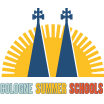
Jukka Jokela M.A. (pronouns he/him)
Project Manager Cologne Summer Schools
Telephone +49-221-470-90812 / +49-221-470-90803
E-mail CologneSummerSchools[at]verw.uni-koeln.de
